#but to be weary of them in commercial uses/for information
Explore tagged Tumblr posts
Text
overhearing my 10 year old cousin watch a video talking about the dangers of misinformation in things like chatgpt and how you should not just mistrust the information but also the intentions of people attempting to sell it to you…… the kids are alright ❤️
#icarus speaks#it sounds like a very good video#like genuinely#it’s going into how these language learning algorithms work#while also discussing how AI/said learning algorithms in themselves are not the devil#and can and likely will become very helpful to humanity in the future#but to be weary of them in commercial uses/for information
131 notes
·
View notes
Text
The Paradox of Influencer Marketing: Finding Authenticity in a Saturated Space
Introduction to Influencer Marketing:
In today's digital landscape, traditional advertising methods are becoming ineffective in getting the attention of consumers. In this context, brands are turning to influencer marketing as a powerful strategy to reach their target audience. Bloggers, social media personalities, or even celebrities could serve as these influencers.
Influencer marketing is when the brand gets the support to advertise their product from those who are already popular personalities on the social platform called influencers. This influencer can be the most famous people, experts, or regular folks with big social media followings.
The essential of influencer marketing is that influencers have already established trust and Authenticity with their audience, making their Suggestions appear more Trustworthy and authentic.
Rise of Influencer Saturation:
The Growth of social media influencers has Converted celebrity endorsements. They engage with Targeted audiences, Assisting brands in sales and customer interaction. However, brands Tackle challenges such as oversaturation, Guidelines, and maintaining authenticity in influencer marketing strategies.
Consumers are Disappointed by the flood of influencer marketing and the Quest for authentic product reviews.
When people see too much sponsored content, they might feel weary or Frustrated. As they browse their social media feeds, they might feel Deluged by a never-ending flow of sponsored posts and ads, which makes it hard to tell real recommendations from paid promotions. This can make them trust influencers and brands less, Resulting in them neglecting or completely tuning out sponsored content.
Authenticity vs. Commercialization in influencer marketing:
The impasse between Authenticity and Commercialization captures the complex challenges and Positive opportunities influencers face on their digital journeys. Navigating through this Complicated environment requires a delicate equilibrium, with influencers assuming the role of digital Innovators, molding the trajectory of influencer marketing. As the industry progresses, influencers who forge authentic connections with their audiences while embracing strategic commercial endeavors are poised to Thrive, establishing a benchmark for ethical and impactful digital storytelling.
Here's why rules and clear disclosure are important for a healthy influencer marketing system:
Forming Trust with Consumers: Using labels like "#ad" or "sponsored content" enables consumers to make informed choices. This can distinguish between genuine recommendations and paid promotions, which builds trust, a crucial factor for successful marketing.
Protecting Consumers from deceit: Regulations prevent Deceptive advertising practices. Imagine an influencer demanding a product they've never tried! Clear guidelines ensure influencers reveal any connections with brands, protecting consumers from false information.
Protecting Influencer Authenticity: Disclosure lets influencers be honest about their partnerships. This transparency resonates with their audience, who prefer genuine opinions over hidden advertisements. Ultimately, transparency enables the influencer's probity and strengthens relations with followers.
Managing Brand Reputation: Supervisory measures hold brands responsible. It follows disclosure rules, brands avoid legal issues and maintain their reputation. Teaming up with ethical influencers enhances brand image.
Some strategies for influencers and brands to maintain authenticity:
Be Honest: Transparency is key. Share openly, admit mistakes, and disclose sponsorships to build trust.
Engage Authentically: Connect genuinely with your audience by responding to comments and messages and showing interest in their opinions.
Stay Consistent: Develop a consistent brand voice across all platforms to Strengthen authenticity.
Tell Real Stories: Share genuine experiences that align with your brand values to create emotional connections.
Choose Partnerships Wisely: Align with partners who share your values to maintain authenticity in collaborations.
Balance Promotion: Avoid excessive promotion and mix in valuable, non-promotional content to keep things authentic.
Show Your Humanity: Highlight the human side of your brand through employee stories, community involvement, and philanthropy.
Listen and Adapt: Pay attention to feedback and be willing to learn and grow with your audience.
Those are the simple strategies that can help influencers and brands navigate the competitive landscape while staying true to themselves and building stronger connections with their audience.
Transparency and Ethical Practices guide the Path ahead in influencer marketing:
Evolving Regulations: Governments and platforms are Implementing rules on influencer Revelation and Morality. Brands need to follow these changing rules to keep trust and stay legal where the brands are "extra careful" about following rules and partnering ethically.
Adopting Sustainability: Consumers now expect brands and influencers to Emphasize environmental and social Accountability. Partnerships reflecting sustainable practices and ethical values connect better with audiences. Social agency, an influencer marketing agency, advises brands to collaborate with partners supporting "social good" and Integrating with the Sustainable Development Goals.
In conclusion, the paradox of influencer marketing demands a delicate balance between authenticity and adaptation in a crowded digital Field. As consumers seek genuine connections amidst the cataclysm of sponsored content, influencers and brands alike must prioritize transparency and trustworthiness. By managing regulations, maintaining authenticity, and evolving to audience feedback, we can forge stronger connections and achieve success in an evolving landscape.
0 notes
Text
A Guide About Effective Material Handling Solutions
Material handling solutions are commercial devices that are utilized to store, transfer, protect, manage, or dispose of items and materials. They not just to increase and boost employee work performance, but they also significantly prevent unnecessary warehouse accidents.
You should know that material handling solutions include a broad range of machinery, appliances, instruments, vehicles, shipping containers, Man Bucket Crane in Goaand accessories used in the manufacturing, Material Transportation In Goa, consumption, & disposal processes.
Storage items
On the other hand, storage systems are typically non-automated and have simple mechanisms. They are mostly used for long-term storage, holding, or buffering of materials. Materials can be stored in a facilities during "slowdowns," or periods when they aren't being moved. The goal of this storage apparatus is to keep production running properly without requiring a halt due to excess goods. Storage items are also very handy for storing excesses in the event of a scarcity or sudden requirement elsewhere. Shelves, racking, platforms, and bins are the most common types of storage machinery.
Products for transportation
Transport systems, in the most basic sense, are equipment that move stuff from one area to another. Transportation can take place from one sector to another, from one end of the facilities to the other, or between a dock platform as well as a storage space. Cranes in Goa, industrial vehicles, and conveyors are the three subcategories of transportation solutions. Whereas trucks can transport items anywhere, Crane Rental services in Goa are limited to specified zones, and conveyor belts can only transport materials across a specific line.
Products for unit load formation
These are machines that retain and limit materials in order to keep them from moving throughout storage or transportation. Loading Unloading Shifting in Goa technology protects the materials and allows multiple items of the same substance to be held by a single entity load. Companies commonly employ skids, packs, cartons, bundles, crates, trolleys, racks, bins, & slipsheets as unit loading formation options.
Machines for positioning
Placement solutions may be useful for handling materials in a single place (feeding, packing, or otherwise moving materials because then they are in the right position for future handling, machining, storing, or transportation). These machines significantly reduce the workload of workers while increasing production. Placement machines are more able to limit material damage than manual handling. They lessen the likelihood of weariness and injury caused by human mistake or inattention. Placement solutions include hoists, tricksters, balancers, turn tables, Manlift in Goa, lifting tables, tilt tables, & industrial robots.
Solutions for Control and Identification
Material tracking is critical, especially in big manufacturing, warehousing, and disposal sites. Control and identification services are mostly utilised by large companies to collect and disseminate information necessary to coordinate the movement of materials within the facilities as well as between the facilities and its suppliers. Radio wave tags, bar codes, & magnetic strips are examples of control and identification gear.
Material handling equipment may have a high initial purchase price, but they can prove to be beneficial and worthwhile investments in the longer - term.
0 notes
Text
Hurt People Hurt People
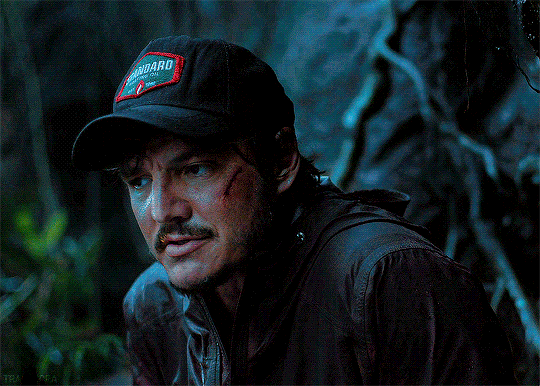
Day 11: C*ck warming (Frankie “Catfish�� Morales x F!Reader)
(For the 2021 Kinktober event offered by @beeschaos and @withlove-sid. The original post and calendar/list can be found here.)
CW: Heavy angsty feelings; talk of drug use; talk of PTSD; smut (PiV; unprotected) 18+ only.
Word Count: 2997

It’s Pope who calls you. He’s quick to say that he didn’t want to call you, but he’s in Colombia, Will and Benny are out of town, and Tom has some family obligation.
Leaving exactly one person – you.
“I wouldn’t ask if it wasn’t important,” he tells you. “But Fish is in a bad place. I talked to him and he sounds…not like himself. Can you go and check on him for me?”
You’re annoyed at the interruption to your quiet evening at home, but you’re also annoyed that Pope sounds so apologetic. It’s Fish. One of your boys, and you’d do anything for any one of them. Of course you agree to drive over to Frankie’s place – it’s only fifteen minutes away from your house – and you hang up on Pope after promising him a full report later.
You know why Pope is apologetic. You pull on your running shoes, pull on a sweatshirt, grab your keys, and then you’re on your way. But you can’t ignore the sick feeling in the pit of your stomach. Frankie. You’ve seen him a lot since the boys mustered out, but there is always a tension there. Unresolved shit. Sometimes you feel eyes on you and look up to see Frankie gazing at you like a dog out of an ASPCA commercial. Big sad brown eyes, but they usually just irritate you.
Frankie can feel sad. It’s a feeling of his own making. He’s the one who wanted to be fuck-buddies all those years ago, calling you when the boys were in town. He’s the one who admonished you when you caught feelings for him, and he’s the one who unceremoniously ended the friends-with-benefits arrangement you had because your confession made him uncomfortable.
He’s the one who knocked up some woman and married her, and he’s the one who had his life fall apart pretty spectacularly. Divorced, a kid he sees every other weekend, and a nasty coke habit to boot.
But if you could talk freely with Pope, you’d admit: yes, you still have feelings for Frankie. Even after everything he did. It hurts to see him in a hell of his own design, and if you can check on him…
He answers moments after you knock on his door. He looks like reheated shit: his hair is tangled and wild, and not with his usual scruffy-Frankie charm. There are deep circles under his eyes, which are bloodshot and weary.
“Hey,” he says. He steps aside, gestures for you to enter, so you do. There’s a hopeful gleam in his eyes, but it goes out when you say that Pope wanted you to check on him.
“Yeah, I’m fine,” he lies, and he rubs the back of his neck. “Just…had a craving, you know?”
“Did you use?”
He shakes his head. “Almost called my old dealer. Had the number pulled up, but…I fought it. Barely.”
You walk into his living room and he follows. He plops down onto his couch, and he looks so damned tired – shoulders slumped, eyes downcast. He looks miserable, and you feel that urge – the urge to fix him, to swoop in and give him comfort.
“Give me your phone, Fish.” You hold out your hand, and he gazes at you a long moment before unlocking his cell and handing it to you.
“What’s your dealer’s name?” you ask, and he tells you. You scroll through his contacts – you see Pope and the Miller brothers’ contacts, but you scroll right past the letter of your last name and don’t see your own. It makes you snort bitterly, but you find the dealer’s name. You delete the information, and you hand it back to Frankie.
“Thanks,” he says, his voice soft.
You look around the place – he had lived here with his ex and kid before they split. He’s made no effort to replace the stuff she took – the mantle over the fireplace is bare of pictures, for example – so it looks like he has just moved in. Or is in the process of moving out. The thought softens you to him, and you sit beside him on the couch. Not close, but beside him, which is something.
“You hungry?” you ask, and your own voice is softer now. “I could order pizza.”
He shakes his head, but then he lies again, says he could eat if you want to stay and maybe watch the game with him.
“Or a movie, if you want,” he adds, and there’s a hopeful edge to his voice.
“Would it help you get through your cravings?”
“Maybe.”
So you shrug out of your sweatshirt, you kick off your shoes. You call in an order for pizza, and you settle in for an evening with Frankie.
He’s not a very good liar though – he really wasn’t hungry, and he picks at his pizza. And he’s jittery – his leg bouncing, his hands raking through his hair so obsessively that you’re afraid he’s going to make himself bald before he’s fifty. He doesn’t pay any sort of attention to the plot of the movie, and it’s one of those car chase movies that don’t require much brainpower to keep up.
Halfway through the movie, you turn and look at him. His hands are trembling, and you feel awful for being so curt when you arrived. You still have feelings for him – you still love him. You’re only hurt, and you should put that hurt aside more readily when he’s in the throes of his addiction.
“How are you feeling, Frankie?” you ask. Your voice is soft, and it makes him turn to you in surprise. He’s not used to hearing you speak softly to him anymore.
“It’s rough,” he admits. “Comes out of nowhere sometimes, the cravings. Sometimes I know what will trigger it, but sometimes….just comes out of the blue. Like…”
He trails off, but you know exactly what he means. Exactly like his PTSD. He had it even back when you were hooking up, the sex sometimes taking on a desperate edge when he clung to you, buried himself in your arms. He just wanted to be held then, a safe place to weep without judgement. You had given him that – and more – but he had still broken up with you…
You push the flare of anger aside. You have to be better, for him. He has next to nothing now: no wife, no kid, no job. Just the trauma of his time in the service and an addiction that is looming at the door, threatening to undo his six months of sobriety.
“If it’s like….that,” you offer quietly, staring at your socked feet stretched out in front of you. “Would it help to…do that thing?”
He knows what you mean instantly. He pulls in a harsh breath and you can feel him staring at you, but you refuse to meet his gaze. That thing – when you used to ride him, both of you coming…and then you would stay on top of him, his softening cock nestled inside you, the weight of your body holding him down in a way that comforted him. He would wrap his arms around you, breathe in the scent of your hair, and it always grounded him. Soothed the demons that followed him from his time in Special Ops.
He doesn’t say no. He says you don’t have to do that. Which isn’t no.
“Would it help you, Frankie?”
You glance over at him, and you see how he swallows hard. How he considers it. You can see how your words affect him – the growing bulge in his jeans. Even the suggestion has your own body responding, the arousal slicking your panties as you wait for him to answer you. Your traitorous body, always yearning for Frankie where your mind knows better.
“Only if you want to,” he responds, and his voice has that low timbre that makes desire pulse between your thighs. His bedroom voice.
You do want to. You know you’ll regret it later, once your mind can power back up – but your mind is quiet on the matter, hazy with lust. You stand up, unbutton your jeans. Push them down with your panties in one motion, and Frankie watches for a beat before standing and doing the same.
You only planned on removing the necessary clothing before mounting him, but he sheds his shirt. Sits back down on the couch, and when you approach, he reaches out with a tentative hand and tugs the hem of your shirt.
“Will you take this off?” he asks. “I want to feel you against me.”
You oblige him. You try to ignore the way his eyes rake over you, the way he sighs when you climb onto his lap. There’s no point in any foreplay – he’s rigid underneath you, you’re slick and ready for him. You reach down and line him up with your entrance, and you lower yourself onto him. It feels so fucking good, being joined to him again, and a flood of buried emotions bubble to the surface.
He must feel something too, because he groans underneath you. He wraps his arms around you, and he tries to chase your mouth with his own to kiss you, but you turn away.
You can’t kiss Frankie. If you kiss Frankie, the teetering on the edge that you’re doing now….well, a kiss will push you over the edge. And you’ll be exactly back where you were years ago – heartsick, lonely, in pain and in love, which seemed much the same to you after Frankie Morales broke your heart.
Instead, you settle your head on his shoulder, the little nook there perfectly sized for your head. You don’t move – you stay settled in his lap. He doesn’t move either. He sighs when you dodge his kiss, but he stills after that. Wraps his arms around you, and you feel him breathing in the scent of your hair. Just like before, and it makes tears prickle in your eyes.
You don’t know how long you stay like that. The stupid movie ends, and the T.V. switches over to sports highlights, but neither of you move. You don’t grind on him, he doesn’t thrust up into you. For you, it’s both intense and intimate. Impaled upon him as you are, not moving, you grow sensitive to the feeling of him inside you. Every curve, every ridge. You can feel the end of him nestled against the end of you, and it might raise a dull ache if he were fucking you – but he isn’t, so it’s just a pleasant pressure that makes your breath hitch in your throat.
For Frankie? You can’t be sure how’s he feeling, but you can guess. His fidgeting stops. His breathing speeds up at first, but then it calms – slow and steady. His hands are gentle on your back, sometimes rubbing you, sometimes just holding you. And it’s like before, how the two of you fall into sync, your breaths matching up so that it’s like you’re one being, breathing together.
You used to pretend that your hearts were beating at the same cadence, but that hopeful optimist of a girl is long gone.
You can feel when the moment shifts from one of comfort and grounding to more. Frankie’s steady breathing starts to get shallow, and you can feel how he pulses inside you, gently squeezing his muscles to gain some movement, some friction. It sets you off – you’re already so sensitive – and you start to move. You don’t ride him. You only grind against him, and the base of his cock drives against your clit when you do.
“B-baby,” he stutters out. “C-close…I’m close…”
“Tell me when,” you reply. It only takes another moment before his hands are on your hips, guiding you off of him, and then you feel it – the warmth as he comes between the two of you, his cum painting your stomach and his.
The regret hits you almost immediately. He tries to reach out, murmuring that he wants to take care of you because you haven’t come yet, but you dodge his hand. You grab some of the leftover napkins from dinner and daub his cum off of your stomach, and you get dressed so fast that Frankie frowns.
“Hey, are you okay?” he asks. “Sit down, we can talk – “
“No,” you cut him off. Take a deep breath, and you can feel the tears prickling behind your eyelids. You pray that they don’t spill out until you are safely in your car. “No, I should go.”
“Hey…” He puts his hand on your arm and you let it stay there for a moment. The tears are burning hot in your eyes, and you pull away, mutter something about getting home before it’s too late. You don’t look at him again – you’d cry if you did – and you flee him.
You are barely out of his driveway before you burst into tears.
*****
Pope should have never sent you. He should have gotten Tom to bounce from his family thing instead, sent a buddy to check on Fish.
He should have never sent you.
It’s obvious, when he finally gets ahold of you. He calls three times, texts five times before you finally answer his call. He can almost immediately tell you’ve been crying, and he knows exactly why. Why else do you ever cry after being around Frankie?
“Shit,” he says. “Are you okay?”
You lie to him. Of course you do. You’ve always taken a tough-girl stance with him and the guys, pretending to be hard like them, pretending not to care when a certain one of them uses you and breaks your heart. Pretending that you’re completely cool with it all, hanging with them when they mustered out and acting like Fish hadn’t hurt you as badly as he did.
It hurts Pope to hear it. You’re such a gentle, soft person by nature. You think you can hide it, but you can’t. He sees all the ways you’re soft, and there’s nothing more gentle than how you care for Fish. Even now, even years after he hurt you so badly. You love Fish, and you put your own feelings at great peril to always help him.
“Fish is okay,” you finally say. Not saying a word about yourself and your feelings – only talking about Fish. Always putting yourself last.
“He had a craving, but I helped….” The way you trail off, Pope can guess at how you helped.
*****
Frankie feels better and worse.
His cravings are gone. As fast and as intense as they came upon him, they disappear – with your help. The feeling of your body on his grounded him as only you could. You were his safe place. His refuge. And not just your body, as he knows you believe.
But now he feels like shit. Worse than shit. He hadn’t meant to use you, but he did. He used you just the same as he always had, and he could see your eyes, shiny with tears, when you fled.
It doesn’t help when his phone chirps. He has a brief bit of hope that it’s you, but it’s Pope.
Pope, giving him hell. Pope, telling him to get his head out of his ass.
Frankie can trace the entire lineage of his sad history with you. Instantly drawn to you – an old family friend of the Miller boys. A one night stand that turns into a second night. But he was in the service, and he heard enough horror stories about girls back home. Cheating, passing off babies for the military benefits.
He should have cut you loose. Should have never kept coming back, jerking you around. Of course you caught feelings for him – you were so damned sweet. You saw the best in everyone, even a piece of shit like him.
It scared him, honestly. Frankie knew he never deserved a woman like you. You were smart and successful, even back then. You had a way of turning even the nastiest, most carnal sex into something meaningful….gazing into his eyes, stroking your fingers through his hair. He started to find peace with you. You started to become a refuge from the nightmares that plagued him at all hours.
It scared him. What could he offer you? So he fled. Everything that came after – his ex getting pregnant, trying to make it work by marrying her. Trying to find another way to deal with the nightmares. Losing everything in the end.
Not everything, though. Despite it all, you’re still here for him. You’re colder now, more curt, but it’s an act and anyone can see through it. You still love him; you’re still hurt by him.
He needs to either cut you loose, or he needs to come clean. Pope tells him his opinion, and Frankie has to trust his friend.
Frankie picks up his phone, but he’s already decided. If you don’t answer, he’ll drive over to your place. It’s gone on for far too long, and he doesn’t want to be a piece of shit who uses you anymore.
He wants to be a man you deserve. He wants to be the man you thought he was, all those years ago.
He scrolls through his phone until he finds your contact information. Not saved under your name at all. It never has been, not since he snagged your number after that first night together. Even back then, Frankie knew. He was just too much of a coward to admit it beyond a jokey little moniker in his cell phone. Now, years later – a divorced addict with PTSD – he thinks he can admit it.
He finds your contact information. A picture he took on the sly of you, a happy smile on your face. You had been laughing at one of Benny’s stupid stories.
And the name he put to your phone number. Not your name – mi alma, it says. My soul.
~~~Tag List~~~ @bananas-pajamas @rachelxwayne @stardust-fray @massivecolorspygiant @imspillingcoffee @amneris21 @paintballkid711 @mad-girl-without-a-box @bestattempt @rosiefridayrogersunday @strawberrydragon @hoeforthefictional @greeneyedblondie44 @leannawithacapitala @stardust-galaxies @isvvc-pvscvl @mrschiltoncat @danniburgh @stillshelbs @girlimjusttryingtoreadfanfics @tobealostwanderer @nuvoleincielo @knivesareout
#frankie morales#francisco morales#frankie morales x reader#frankie morales imagine#francisco morales imagine#catfish morales#catfish morales x reader#catfish morales imagine#Triple Frontier#kinktober2021
544 notes
·
View notes
Text
Me, throughout the entirety of 6x05:
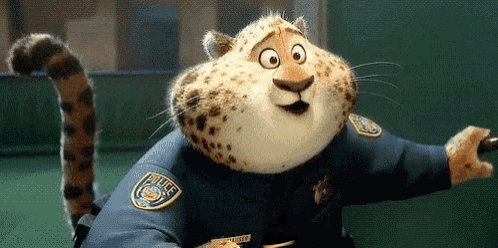
And I suppose I could just leave it there but NO, we’re doing a LIST. Of all the excellent things from “Prom Night!”
SPOILERS!
AV Club reviewer giving this episode the first ‘A’ of the season: :D
AV Club reviewer still insisting that “Midvale” was filler: D:<
Forever destined to disagree with the AV Club reviews in some way or another...
Okay, so! We begin with a very helpful reminder from Alex that things are different, in this Post-Crisis World!
(I mean, on the one hand, am I slightly distressed that key aspects of the Pilot and the WHOLE of “Midvale” are now gone, along with Earth-38? Yes.
On the other, Kara remembers her lived-experiences of everything that had transpired in the Earth-38 timeline, so they still sorta happened and have informed her characterization.
So...it’s fine. It’s fine. This is fine.)
I do love that, ‘Kara punched a meteorite out of the sky’ is now a Thing That Happened, though.
(Well perhaps NOT ANYMORE but I’m getting ahead of myself.)
KENNY LIIIIIIIIIIIIIVES!!!!!
“Scooby-Duo” listen, as someone who has already imagined all these kiddos in Hanna-Barbera cartoon style, running around Midvale, solving crimes and saving the day, I loved this description.
Alex being like, ‘DO. NOT. SCREW UP. MY PAST.’ ahhhhh we love to see that scary Older Sibling energy on full display.
And then Brainy and Nia are off to the past!
The only thing that could’ve made the utterance of ‘totes’ worse would’ve been the addition of, ‘magotes’. Thank goodness they exercised restraint in the writers’ room.
FORTUNATELY the terrible ordeal of reliving dated slang is offset by some truly excellent lines and line-reads throughout the rest of the episode.
For instance! Loved Brainy’s, ‘the perfect optical illusion’ and ‘off the dash, please.’ So great.
Other honorable mentions: ‘Damn it, Mitch!’ ‘That’s a LOT of exposure’ and I forget the line itself but when Cat’s like, ‘normal town my a--’ and then the cut to commercial break AAAAAHHHHHH so good.
Okay, back to the episode, Nia and Brainy, on the Legion Cruiser, AND THEN!
AND THEN AND THEN AND THEN!
OUR KIIIIIIIIIIIIIIIDS!!!!!
I love them. It won’t happen, but gosh, I want a Midvale spin-off so bad.
Like, the Crisis retcon made some space in the girls’ past for a spin-off to actually...kinda work.
(But sustaining the premise across multiple episodes/seasons would be tricky and there would always be the threat of running up against like. The current show’s continuity.
But hey! They could just ignore it, I guess! That’s what the Superman show is doing!) *insert frowny emoji here*
So the kids have gathered with Alex for milkshakes, which is delightful.
But ALL IS NOT WELL! As Alex reads about the ‘luckiest town’ and is like:
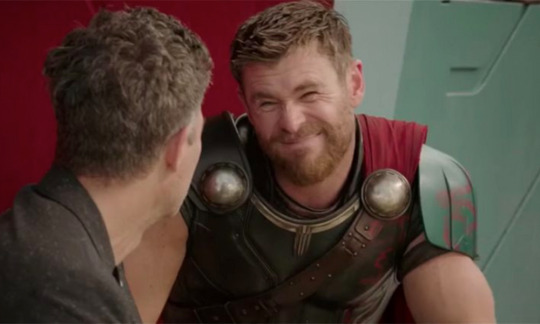
(Except with a lot more anxiety and frowning)
I feel as though we already knew Alex went to Stanford but I can’t remember if Kara’s (terrible) resume revealed that she went to National City University?
*Checks* Yes it did.
Another thing I LOVE is just. Alex as the Responsible One, whose anxiety is perpetually cranked to a 9.5, driving the Scooby-Duo around in the suburban mom van for super-ing jobs.
Also, ‘super-ing’ is an excellent verb, 15/10
Young Cat Grant! ....More on her later.
Nicole and Jesse did such a great job with the comedy in this episode--their initial attempt at a cover story/lie is so good.
And the masterful transition into an actual good lie that Nia knew would win Kara over...VERY NICE.
Kara being so obviously thrilled that there are OTHER ALIENS! WITH POWERS! HERE, IN MIDVALE! RIGHT HERE!
Fandom has ruined the whole ‘Kara has golden retriever energy’ as is their way but I must say...very much getting ‘excited puppy energy’ here.
Nia and Kara comparing powers was so CUUUUUUUUTE!!!!
As was the picture on Kenny’s desk of him and Kara. D’aaaawwww.
(But OH NO SADNESS...BECAUSE A BREAKUP IS IMMINENT.)
Okay in addition to all of the incredibly adorable content we also get lots of FAMILY FEEEEEEELINGS, which: Yes, good, yes.
But Eliza is only here as a PICTURE on Kara’s nightstand and a NAME on Alex’s badge, I am sad. :C
(Hope Helen Slater is in this last season at some point...need that soothing mom energy after all the Phantom Zone angst)
I think I’m out of order now but Kenny wanting to help Kara help people is just. The most adorable thing.
Spoiler alert: I use the word ‘adorable’ a lot in this list. Sorry...but also not.
The Brainy music when he’s in the school computer lab watching the printer is really great. I think we’ve heard it before, but it meshed so well with the whole vibe of both the character and the episode, just stood out nicely, I guess.
Okay, so. Do we think that Jesse could always do the baseball bat tricks, and the writers wrote it in, or do we think that he learned them for the show? My money is on the former.
Either way, very impressive.
And now for the truck situation! I kinda thought it would turn out that it was Cat’s doing, as she was trying to suss out the ‘super’, but nope, it was the blue dudes.
(Which makes more sense, since they have no qualms about endangering other people.)
And ON THAT NOTE, the blue guys! They are the perfect level of ridiculous, and they are wonderfully straightforward in ways that the Phantoms are not.
Also, I love that one of them is named Mitch?
Nia and Kara save the day!
After Kara busts the brakes and is like, ‘uhhh....they’re not working’
I noticed the Metropolis license plate and while yes it’s a little strange that plates are...apparently city-based in this corner of Earth Prime, stranger still is that Cat presumably drove clear across the country to check out this story. Right? Like, that’s the only way she has that plate out in Midvale?
Wait, wait. Totally forgot to mention Kara and Nia’s EXTREMELY OBVIOUS ‘don’t be suspicious’ sunglasses gambit at the Midvale College campus you absolute DORKS.
Right, so.
Remember those FAMILY FEELZ??? WELL!
We’ve got Nia’s call to her mom, which, oof. OOOOOF.
And then we have even MORE FEELINGS aka: The garage talk.
Okay. OKAY. So even though I’m a little sad “Midvale” no longer occurred in Earth Prime’s timeline, I am fascinated by the ways this new series of events have impacted Alex, Kara, and their past. (Also thrilled that Kenny lives, natch). Alex’s resentment and the burden of ‘protect Kara, PROTECT KARA’ have been left to simmer while Kara’s determination to help people has led to some...earnest but slightly careless secret hero work. The building blocks of the conflict introduced in “Midvale” are still there so while it might at first seem a little...repetitive, for Alex to lay all this out to Kara, it’s really just the reveal of a new boiling point; a post-crisis update on the scene in Midvale where Alex is like, ‘I had two parents before you showed up.’
AAAAAAAAAHHHHH IT’S EMOTIONALLY DEVESTATING I LOVE IT.
And then like. The new, but also not-new angle, of Alex leveraging her world-weariness against Kara’s youthful optimism/somewhat reckless desire to help, and then Kara throwing BACK that she’s explored other solar systems.
The LAYERS.
Also that Alex is like, ‘we need weapons, let’s tell mom and also call the DEO,’ classic Alex.
The garage talk ends with Kara determined to come clean to Kenny...BUT OH NO, THE HERO HIDEOUT IS SO CUTE, AND KENNY IS SO DEAR.
And the reveal that the almost-kiss in “Midvale” actually happened d’awwwww these kids.
Like. I am legitimately torn, here. I totally understand and support Kara in being honest with Kenny about the whole college situation--but also GAH. KENNY IS SO NICE AND CUTE AND EARNEST.
You know what ELSE is nice and cute and earnest?
Nia singing “9 to 5″ to Brainy to cope with stress and boost morale.
Heckin’ adorable, gosh.
Aaaaaand some other stuff occurred as the episode closed out but I don’t have them in my notes and BASICALLY I want the next hour like, now. Right now. Because this was WONDERFUL. FROM START TO FINISH.
So some Overall thoughts!
I said we’d get to Cat ‘CJ’ Grant later, so here we are: I...think I liked her? Overall? It was a performance that gradually won me over, is how I would describe it.
Absolutely wild that Cat built a media empire in a mere six years.
Also her whole, ‘I am going to find this extraordinary being and name them and kick Lois Lane into the classifieds’...I mean she eventually gets two out of three, there.
As I already started to mention, sad that Eliza wasn’t here! But it makes sense, since a lot of this, Kara is trying to keep on the DL.
Obviously, I am ALWAYS down for these flashback situations with the young Danvers. But it was also nice to take a break from the Phantom stuff. The plot here is simple/streamlined in a way the Phantom stuff...isn’t. I love the emotional character stuff coming out of the Phantom Zone arc but wow, the Phantoms are just. Needlessly complicated.
The little episode recap where Lena is explaining that Phantom Prime is like a bloodhound was like, ‘oh right, they do that too...in addition to all the other stuff that they apparently do.’
So, yes. Welcome change.
The change of scenery + type of action was nice too!
Though RIP to everyone’s hair, fighting against the moisture.
This episode also handled the Brainy/Nia relationship really well, IMO. Like, due to the whole, ‘trying to fit so much in, always’ approach to Supergirl episodes sometimes results in a bit of...one-sidedness, for various characters. Think for instance of Kelly needing to cheer everyone on in episode 2, but not having space for her own feelings/emotional needs in that episode.
I’ve felt that a bit with Brainy and Nia thus far--one will sort of take up more narrative space, so the relationship feels a little lopsided.
NOT SO HERE! They are both going through some stuff, they are both struggling to cope, they both come to rely on one another for help.
YES. GOOD. YES!!!!
Something I’m loving about season 6 overall is that so far, it doesn’t feel like the plot is stepping on character development too much. Like, it still isn’t a perfect balance, and some episodes manage it better than others, but compared to season 5? Leaps and bounds.
Everything was so nicely tied together and the dialogue was witty, the humor was delightful, EVERYONE WAS ADORABLE AND EARNEST AND DID I MENTION ADORABLE?* but they never lost sight of the themes and emotional through-lines and GAAAAAHHHHHH MIDVALE EPISODES ARE THE BEEEEEESTTTTTTTTT!
*Okay Alex was mainly stressed out but that’s to be expected.
TL;DR - Best episode of the season thus far? Best episode of the season thus far.
13 notes
·
View notes
Text
15x15: Gimme Shelter
Then:

Dean used his words to save the world once
Now:
At a food bank community center, three teens dole out food while stressing out about one attendant who’s breaking their cleanliness rules. Connor heads over to talk to the woman, but is stopped by the center’s pastor. The pastor challenges Connor’s motivation. ”We have rules, but we also have spirit too, right?” The pastor tells Connor to lead with compassion, so Connor brings the woman food instead of kicking her out of the building.
Later, Connor walks home. Much like all other cold open walks, this one also involves a solitary alley. He hears someone calling his name. Trying to find the source of the voice, he trips and finds a talking teddy bear, and a metal hook around his neck.

Dean and Sam discuss research. Sam’s found a non-case, while Dean’s hit the jackpot in Atlantic City. Specifically, an unexplained blackout has him thinking that Amara’s enjoying her new gambling addiction on the East Coast.
Cas pops up and thinks he should go with the brothers, but they tell him to stay put and babysit Jack. I say TFW is just better together, but I’m not writing this episode. Hrmph. The brothers are packed and ready to go, but Jack stops them in the war room to ask about the case Sam found.
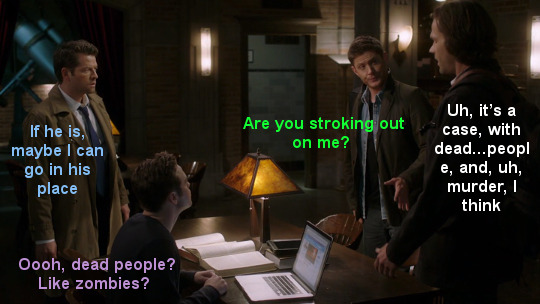
Sam tells him it’s nothing. Dean encourages Cas and Jack to investigate --to keep Jack busy. Cas seems skeptical, but Dean insists.
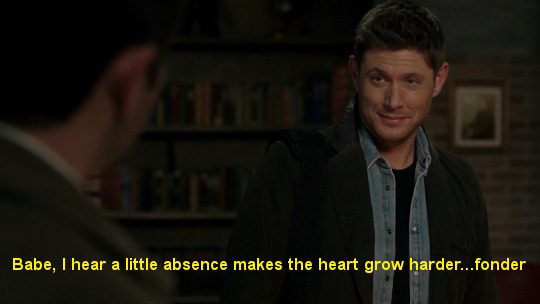
Agents Swift and Lovato meet with the local law enforcement to learn more about the case. Sweet Jesus is it cute that Cas continues to use pop-star names. It’s cute that Jack takes after his father with the upside down badge. It’s cute that Jack recognizes the teddy bear and says he has one (Did Cas buy it for him? He has a history of buying stuffed animals for his quasi-children.)
The sheriff tells them about the victim, and how the word ‘Liar’ was carved into him.
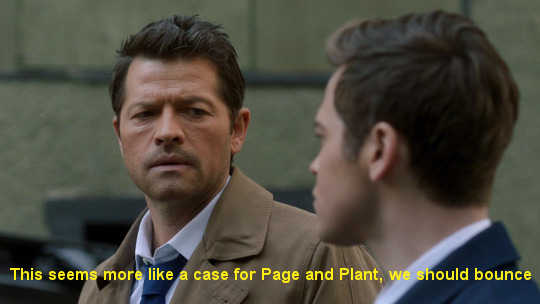
Jack posits that this all seems demonic.
Cut to Cas digging into the ground at a crossroads. Time to get some information. Cas buries a picture of himself that Dean took when he was wearing a cowboy hat (Don’t worry, Dean still has his copy, and keeps it safe…. for reasons.) and Jack sets up a social media account. He’s WAY under 13 years old, so he needs a parent’s permission. Cas grants it easily. (Also, ALSO!! ALSO, there are NOT too many cats on the internet. This writing is so OOC, smh.)
A demon appears.
He’s channeling his inner Crowley, and I suddenly miss the bugger for a moment. Zach, the demon, is very bored and desperately wants something to do. He’s not really British and tells the duo that no one's making demon deals right now. Rowena’s of the philosophy that “people will end up where they belong.” Cas realizes their mistake and moves to leave. “Sam was right, it’s not a monster,” Jack laments. “He was half right. Sometimes humans can be the worst kind of monsters,” Cas adds.
At the community center, a woman locks up, and grabs a whole lotta cash from the donation box before she bails. Once outside, she hears a voice call her name. She looks around but sees nothing. She turns back to her car to find a masked individual. A weird editing choice cuts back to her...and commercial.
Cas checks in with the brothers. Dean tells Cas to be wary of those “Hallelujah types” and I’m like, wha? Cas is an ANGEL OF THE LORD. He’s been around the block, Dean. Lol for looking out for your BFF, tho. Also, second awkward moment of the episode when Dean just hangs up on Cas? I’m…

Sam voices his reservations about the whole finding Amara --lying to Amara --killing Amara plan. Say it louder for the brother in the seat next to you, Sam!
(Boris: I’m just going to insert this in the middle of this recap and never mention it again. Can we trust Billie? Is her plan actually something that is GOOD for our TFW 2.0? What is her agenda and does it align with what we want? What if what SHE wants is as equally bad as what Chuck wants? What if we as an audience are getting played right now??) (Natasha: What if the strings she’s pulling are emotional and she’s playing a dangerous game of chicken with Dean’s rage and Chuck’s entitlement?)
Jack joins the community center. He watches Dr. Sexy the pastor in a prayer circle, and talks to a disillusioned young woman who asks him to fill out a form before walking away.
Cas walks in separately and wanders over to Dr. Sexy the pastor praying with a parishioner, and tells him about the cash stealing Valerie. She never made it home.
Cut to Valerie tied and gagged. Her hands are in an elaborate guillotine. She wakes. Her screams are muffled. A TV turns on and flashes the word ‘Thief’. And one of her fingers gets chopped off. A timer starts on the TV. AND WE ALL RECOIL.
Jack finishes the paperwork and tries to talk to the girls working the food line. The one girl storms off, upset. Jack follows her and tells her that he didn’t mean to upset her.
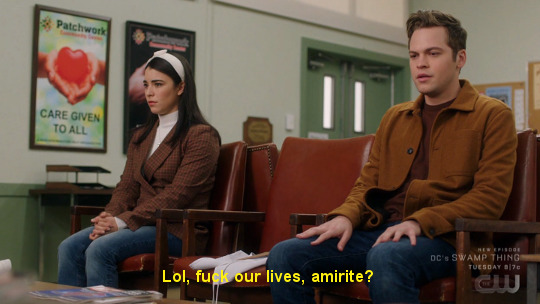
She tells him that Connor and her dated. Well, they watched a lot of old movies together. (AHEM! AHEM! AHEM! “I’m your Huckleberry.” AHEM. Please stop the clowning, it hurts so much.)
Jack confesses to the girl that he lost his mother. The girl tells Jack that her mom died three years ago, and now it’s just her and her emotionally unavailable father, the pastor. “I have more dads than most, and I’m always just feeling like I’m letting all of them down.” JACK!!!! The girl tells Jack to trust God, not people.
And we laugh, and laugh, and, guh, laugh.
Cas, meanwhile, meets with Dr. Sexy the pastor.
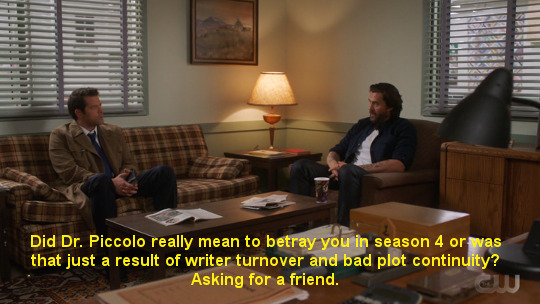
Cas interrogates Dr. Sexy Pastor about whether anyone else has gone missing recently. Well, there was one guy who used to work for the “faith-based community” but they parted ways. Cas and the pastor enjoy a little god talk. Cas, the weary angel, opines that God just doesn’t care. The pastor has a different take on faith - it’s about the people of his church doing what they can to take care of each other. We learn that this church recently changed from a fundamentalist branch to something more welcoming. Connor was able to come out as gay due to the changes, so some good happened. (Hindsight thoughts: this makes his death and the “Liar” all the more awful.) “A saint is a sinner who keeps trying,” the pastor concludes...and if that ain’t the truth about Cas!
Sam and Dean are on the too-slow train to Atlantic City when Amara drops in during a gas stop and invites them out for pierogi.
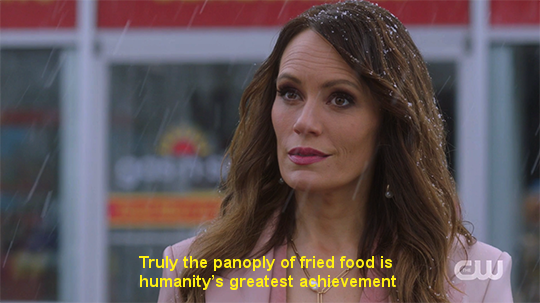
At Patchwork, the pastor asks Jack to share his journey of faith during a prayer circle. Jack falters, and Cas steps in. “I do know what blind faith is. I used to just follow orders. Without question. And I did some pretty terrible things. I would never look beyond the plan. Then, of course, when it all came crashing down I found myself lost. I didn’t know what my purpose was anymore. And then one day something changed. Something amazing. I guess I found a family. And I became a father. And in that, I rediscovered my faith. I rediscovered who I am.” BRB crying!
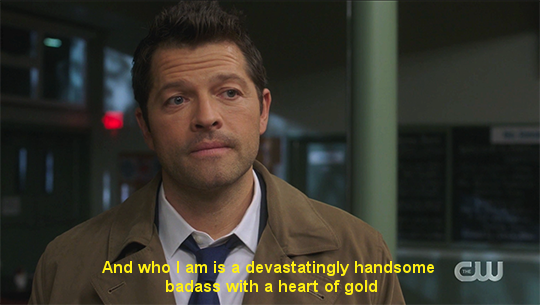
Later in the cafeteria, Jack asks Sexy Pastor, M.D. how he brought together so many people with different ideas of religion. “It’s not about what they believe. It’s what they do,” he reiterates. (I imagine, for a moment, an ending where Jack calls out to the whole world and all living creatures and Heaven and Hell unite to win the final confrontation and make a better world together.)
The tranquil moment is interrupted by the TV turning on to security feed footage of the victim. The timer runs out and she loses another finger and screams and screams. Jack rushes over to the TV and pulls out a USB stick from the back.
Meanwhile, the Winchesters dine with Amara.
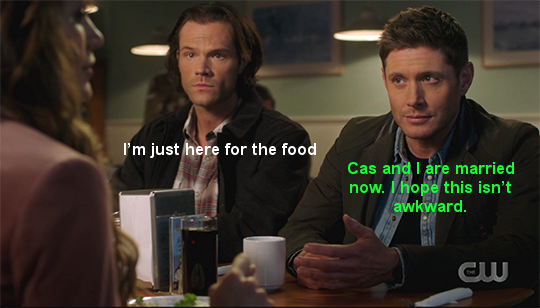
They bring up Chuck’s destruction of the other universes and tell her they have a plan to stop him. They’ve got a nephilim on their side AND he’s super powerful. All they need is for Amara to help them trap Chuck and...WHAMMO. Amara gently refuses to betray her brother. She lays some new mythology on them. She and Chuck are twins - creation and destruction - and their splitting apart first brought life into the world.
Cas and Jack barge into the church’s ex-AV tech’s room. And by that, I mean, Jack gets hurled through another door? Um. Okay. The part of me that grew up with 3 Stooges is HERE FOR IT, tbh.
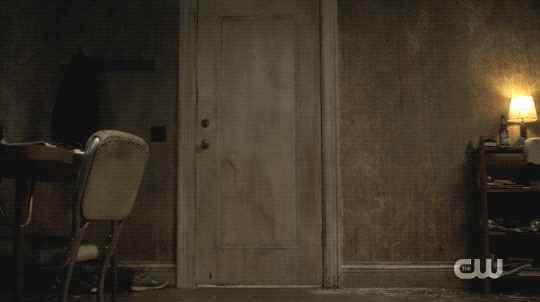
They discover the guy is dead, chained up in bed with cuffs, with the word “lust” painted above him.
Getting ready to leave town, Sam’s ready to accept Amara’s choice. Dean “Fuck Acceptance” Winchester heads back inside and corners Amara. He asks why she brought back Mary.
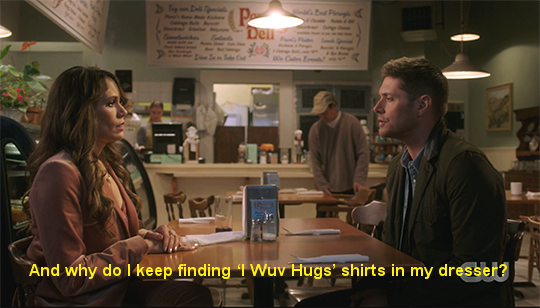
Amara tells him that she wanted him to see that the apple pie dream life he’s always striving for isn’t real - that Mary was only human - and BETTER because of that. Amara thought that would help him to accept his life. Amara also thought that having Mary back would release Dean from his anger.
He leans forward and lets her know that he’s furious. Everyone in this universe is trapped, he tells her - including her. And she’s doing nothing. Amara falters in the face of this, and then asks him if she can trust him. “I would never hurt you,” he LIES TO HER FACE. She tells him she’ll think about it.
That evening Sylvia, the pastor’s daughter, listens to her friend gush over the social media attention she’s getting after posting about the torture video. In a flash of rage, Sylvia stabs her friend and races away. Dr. Sexy Pastor finds the current (still alive) victim just as Sylvia catches up to him. She accuses him of laughing at her mother after her mother died from trying to heal by prayer rather than medical science. She accuses him of changing the church that her mother grew up in. Jack jumps into the fray and gets stabbed for his trouble. When Cas arrives, Sylvia is quickly subdued by his Vulcan forehead tap of slumber.
Cas yanks away the restraints from the victim (SOOOO strong) and then heals her fingers back on while the pastor looks on in wonder.
For So Strong Science:
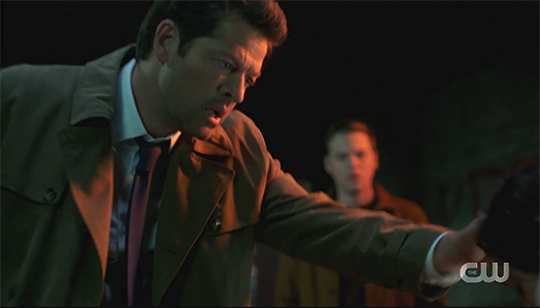
Later, they gather outside while Sylvia gets taken away in cuffs. The pastor still cares about his daughter and vows to get her help. The driver of the car is Zach the crossroads demon? Oookay.
Cas and Jack drive home. In the truck of feelings, Cas asks Jack why he couldn’t share during the prayer circle. Jack confesses that he’s been lying. The spell Billie is doing with him is turning him into a bomb to be used against Chuck and Amara. It’ll work - they’ll cease to exist. But Jack will be obliterated too. “This is the only way they’ll ever forgive me,” he tells Cas.
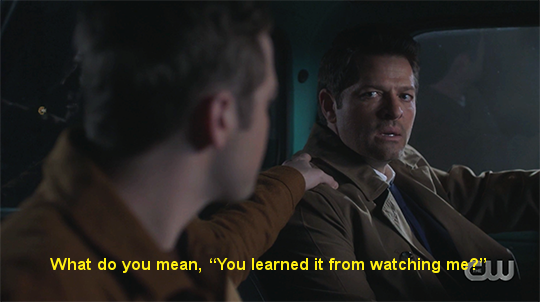
Cas is horrified. He can’t watch Jack die again! Cas refuses to watch Jack die again, but Jack seems to have fully embraced this as his necessary fate.
Back at the bunker, Dean heads for the whiskey bottle late at night when he spots Cas shuffling towards the exit. Jack’s settled in his room, Cas reports. Cas then tells Dean he’s going to look for “another way.”
Oh AND, “In case something goes wrong and I don’t make it back, there’s something you and Sam need to know…”
FADE. TO. BLACK.
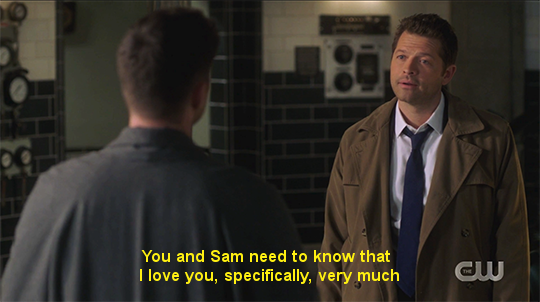
The Se7en Deadly Quotes:
You guys go Highway to Heaven that bitch
You look greener than Baby Yoda
“Did anyone find any tiny bags with chicken bones inside?” “Did anyone smell sulfur?” “Did anyone feel cold?”
There were too many cats
Where can I find the Kool-Aid?
I wanted you to see that your mother was just a person
It was a gift, Dean. Not a trial
Want to read more? Check out our Recap Archive!
#spn recap#dean winchester#sam winchester#castiel#cas#jack kline#spn 15x15#gimme shelter#supernatural season 15
56 notes
·
View notes
Photo



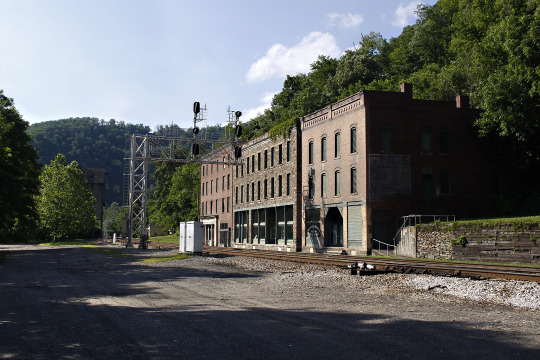

Thurmond, West Virginia: a Rail Road Town that the World Passed By, Then Found Again (sorta’) - Updated.
As I explained recently over a dinner with friends in town (for the first time in how long?!), Thurmond, West Virginia was south and west of Pittsburgh, so it seemed like a good option for a kind-of side trip on the way home from Pennsylvania. Little did I know how long the trip south would be, but glad I was to have done it.
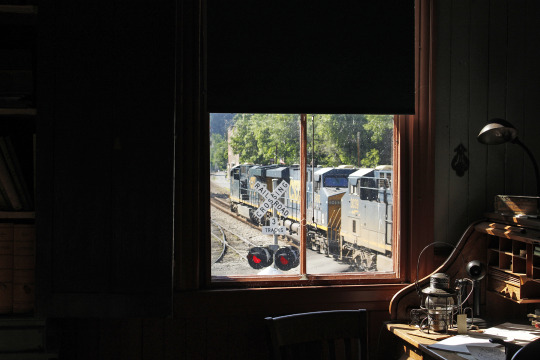
A CSX coal car drag passing the Thurmond Depot, as seen through the window of the yardmaster’s office. [1]
The town was founded by one Capt. W.D. Thurmond in 1873, the same year the Chesapeake & Ohio Railway completed main line track building through the New River Valley. The New River Valley was scene to intensive coal mining in the latter half of the 1800s and first half of the 1900s, and Thurmond was literally and figuratively at the heart of it all.
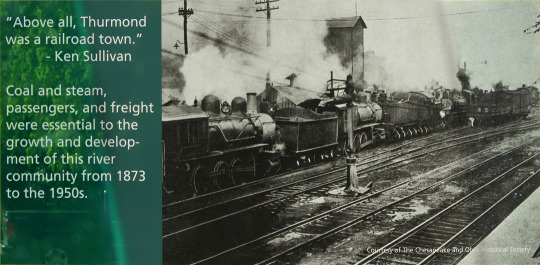
I believe the tall structure visible through the coal smoke and vented steam is the coaling tower. [2]

Thurmond in 1988. Conspicuously absent now are all the structures on the left side of the tracks -- as well as the tracks to the left. [3]
The New River Valley was also the scene of some of the worst of the “coal field wars:” the operators paid by weight, ran company towns and stores, and lured unsuspecting laborers into the valley with promises of good wages -- promises that never materialized. Instead, coal weight was shorted, company rents and store fees were exorbitant, and rules were enforced with extra-judicial posses, bought-off law enforcement officers, and state militia at times. Miners were repeatedly denied recognition of their unionizing efforts, scabs were thrown in between the simmering, or boiling, antagonists, and strikes devolved into shooting matches.

Thurmond in 1988. [3] Two generations of water towers (near center) holding hundreds of thousands of gallons of water for the thirsty steam-powered engines, and the post office building (at right) CSX removed the water towers in the 1990s.

Concrete footings for the water towers seen in the 1988 photo above. The post office building still stands (at far right), and is still U.S.P.S. property, though it is no longer in operation. [1]
Thurmond was the vital hub for the C&O and for all the various people who moved through the Valley throughout the coal mining years; in 1910, Thurmond moved more freight and passengers than any other town the rail road serviced. It’s hard to imagine today, but from its founding until the early 1920s, Thurmond could only be reached by rail, and thousands of people moved through or lived in the town, going to work in a mine, working for the C&O, or providing goods and services.

The Marilyn Brown house, with the roofline of the Fatty Lipscomb house beyond. [1]
At one time, Thurmond boasted many commercial structures, scores of houses (like those above), and was also a service hub for the C&O’s engines and rolling stock. Steam-powered rail road engines require daily maintenance, work that was effected in a large engine house that was perched above the river.
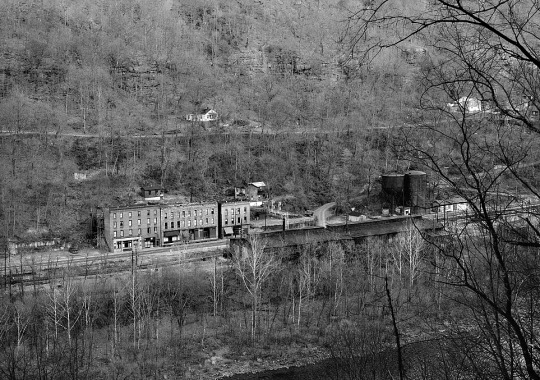
Thurmond in 1988. [3] The engine house is right of center in the mid-ground, behind the trees. Some of the remaining private houses can be seen uphill behind the commercial buildings, as well as the one “street” that wound across the face of the hill.
Like so many towns built around 19th century industries, Thurmond’s importance declined dramatically as the 20th century proceeded. The use of diesel rail road engines left steam engine mechanics unemployed; many of the mines played out, and those that remained (and remain still) employed far fewer miners to pull the coal from the seams -- or blast it from hill tops; and people who would have been passengers on the trains began driving automobiles. The world, if you will, moved on, and Thurmond dried up.


Two views of the Fatty Lipscomb house. [1]
As coal mining declined, though, tourism increased, and in the 1960s and 1970s, enthusiasts of outdoor sports found the U.S. Congress receptive to the idea of setting aside some of West Virginia’s landscapes for boating, hiking and camping. In 1978, a substantial swath of West Virginia was designated as the New River Gorge National River, and later, lands along the Gauley and Bluestone Rivers were conserved, designated as National Recreation Areas in 1988.

Another house, here perched on the hillside above the commercial district, and a stretch of the local roadway, looking downhill. [1]
Once the land along the rivers became national reserves, Thurmond basically passed into federal control, though up until the early 1990s, up to 50 people still resided there. The Chesapeake & Ohio had also declined, and became a foundational holding of today’s CSX Transportation rail road company. CSX still moves coal through Thurmond in long drags of hopper cars, either full and destined for power plants, or empty and heading back to the mines.
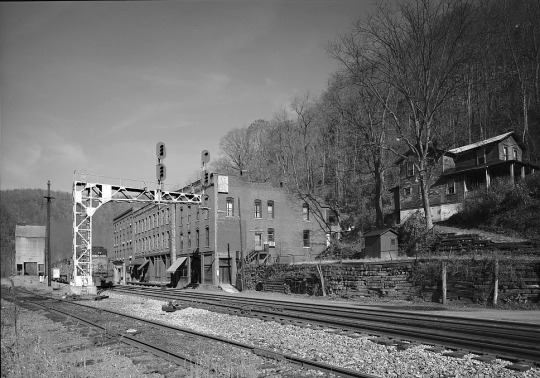
In 1988 (above) [3] and in 2021 (below). [1] The view below is perhaps the best known angle of the old commercial buildings. From right, these are: the Mankin-Cox Building, the oldest of the three, which housed a druggist and a bank; the Goodman-Kincaid Building, which housed a dry goods store as well as offices and apartments; and the National Bank of Thurmond Building; all held a variety of business concerns before business fled. To the upper right is the Erskine Pugh house. The track in the foreground has been removed.


Circa 1900 [2] The engine house is right of center, with the commercial buildings to the left. The large building at far left was a hotel, but it burned down and was replaced by an Armour meat company building -- which also burned, in 1963 . The depot (seen following photo) is at the far right, with the rail road trestle just in view.

The 1904 passenger depot, now the NPS visitors center (as of 1995), and yes, Amtrak does have Thurmond as a stop! [1]
The NPS owns most of the remaining buildings, and efforts began in the early 2000s to keep them from deteriorating further, with roof repairs and seals to keep out the weather. There are still 5 residents in Thurmond, all are on the town council, and in addition to being active within the park, they are also seeking ways to keep the town alive.

The red house at left is new construction, but on an old foundation, and where possible, older building materials have been recycled in its build-out. A project of Thurmond’s residents, the hope is to have it available for seasonal leases; my guess is it’ll wind up with a long wait-list -- and my name will be on it! [1]

Old rail road ties in the dirt: now an access road, the C&O service track that led to the coaling tower were once mounted here; the engine house would have been to the extreme right and partially out of view; the depot is dead ahead, and my road-weary car is parked near the trees. [1]
Maybe I was taken-in by the town because of the setting, nestled as it is among the hills and above the river; maybe it’s because the old buildings have that “certain something” that makes history buffs like me snap more photos than is reasonable; maybe it’s the potential that I can see in them (provided anyone ever coughed up the money to really rehabilitate them); if I was to get metaphysical about it, maybe it’s because of all the lives and history that occurred in the area and the energy left behind calls out still (y’know if I got metaphysical about it -- past lives anyone?); perhaps it’s all of those. What-ever the reason, I’ve been thinking of making a trip back in mid-Autumn, take a long weekend as the leaves are turning and it’s got chilly -- and shoot yet more photos than is reasonable.

The 1922 coaling tower (above), built by Fairbanks Morse (as noted on the sign below). [1]


The reason for the coaling tower: a pair of the last steam engines in Thurmond: 1953. [2]
I briefly stopped at the New River Gorge visitors center where I got directions, and figured I could at least find out where I was going before getting off the highway for the night. I arrived in Thurmond just before 5 PM, but even that later afternoon hour left plenty of daylight to walk about and take photos. My thought had been to simply find Thurmond, then make my stop-over somewhere nearby (Beckley, WV is less than 10 miles away) then return in the morning. That thinking quickly became “Oh! I can come back for more in the morning!”

Up the hill: the old church. [1] The church grounds now host the local triathlon and reunion events for those who once lived in Thurmond.
What I realized as I strolled around in the afternoon, was that the light would be dramatically different if I arrived early the next day (yeah: a “well duh!” moment if ever there was one), an effect of the changed daylight hours mixed with the topography that proved itself quite wonderfully -- and is why the images here show both the golden glow of evening and the cool white of morning.

Amtrak’s Cardinal route-train, on-time (or nearly) on a Friday morning. [1]
Standing by my car, having a sip of coffee, looking around as other visitors arrived or departed, I just, well -- “sighed with contentment” is an apt description.

A view of the ticket agent’s office. [1]
For more information on Thurmond:
The National Park Service’s web page for Thurmond, WV.
Thurmond, WV on Clio, a history and culture website.
Both of these share some of the same information, and each has additional images, both historical and contemporary.

A view of the New River Valley from the west side, across from Thurmond (note the houses and rail road cars on the far bank below the hill). [4]
The historical narrative written here was gleaned from the NPS hand-out for Thurmond, as well as from the Summer 2021 issue of National Parks magazine, published by the National Parks Conservation Association (“Miner’s Angel” concerning Mother Jones and the coal field wars of West Virginia, by Nicolas Brulliard). Identification of the Marilyn Brown house made possible by access to a PDF of the NPS’ structural assessment report of buildings in Thurmond, revised edition, published in 2002.

A view of the yardmaster’s office [1]
Atlas Obscura’s “22 of America’s Best Preserved Ghost Towns” Sorry, Mental Floss, you were forgot.

Looking south toward the depot past the three old commercial blocks. [1]
[1] Photographs by R. Jake Wood, 2021.
[2] Historic photographs displayed on-site by National Park Service, photographed on-site and edited for this posting by Jake Wood.
[3] Photographs by Jet Lowe, 1988, for the Library of Congress’ Historic American Building Survey/Historic American Engineering Record; retrieved from the Library of Congress’ Prints & Photographs Online Catalog, with minor editing by Jake Wood.
[4] Photograph by the Detroit Publishing Co., circa 1910; from the Library of Congress’ Prints & Photographs Online Catalog, with minor editing by Jake Wood.

The depot, alongside CSX trackage. [1]

CSX coal drag outbound with hoppers full of coal. The post office building is visible just beyond the engine. [1]
3 notes
·
View notes
Text
INSIDE a flimsy temporary office on a dusty movie lot here, a young man sits in front of a computer, showing off a three-dimensional rendering of the collapse of the World Trade Center. It was assembled by merging the blueprints for the twin towers — the before-picture, you might say — with a vast collection of measurements, including some taken with infrared laser scans from an airplane 5,000 feet above Lower Manhattan, just days after 9/11.
With a few clicks, Ron Frankel, who has the title pre-visualization supervisor for Oliver Stone's new 9/11 film, begins to illustrate the circuitous path that five Port Authority police officers took into the trade center's subterranean concourse, until the towers above them fell, killing all but two.
As Mr. Frankel speaks, behind his back a burly man has wandered through the door. He is Will Jimeno, one of the two officers who survived. He has been a constant presence on the movie set, scooting from here to there in a golf cart, bantering with the actor playing him and with Mr. Stone, answering questions and offering suggestions — a consultant and court jester. But he has never seen this demonstration before, he says, pulling up a chair.
Mr. Frankel, continuing with his impromptu show-and-tell, says the floor beneath Mr. Jimeno, Sgt. John McLoughlin and their three fellow officers dropped some 60 feet, creating a 90-foot ravine in the underground inferno. The difference between instant death and a chance at life, for each of the men, was a matter of inches.
Mr. Jimeno sits quietly, absorbing what he's just seen and heard. His eyes moisten. "I didn't know this," he says. "I didn't know this. I didn't know there was a drop-off here. This is an explanation I never knew about." He pauses. "We try not to ponder on it, because we're alive. But it answers some questions. That, really, played a big part in us being here." The countless measurements taken and calculations made by scientists and government agencies helped ground zero rescue workers pinpoint dangerous areas in the weeks after the attacks. The data also provided a fuller historical record of how the buildings collapsed and lessons for future architects and engineers.
Only a movie budgeted as mass entertainment, though, could harness all that costly information to reconstruct the point of view of two severely injured and bewildered men, who didn't even know the twin towers had been flattened until rescuers lifted them to the surface many hours later.
Their story, and those of their families, their rescuers and the three men killed alongside them, is the subject of Mr. Stone's "World Trade Center," which Paramount plans to release on Aug. 9.
The quandary that Paramount executives face is a familiar one now, a few months after Universal's "United 93" became the first 9/11 movie to enter wide theatrical release: How do you market a movie like this without offending audiences or violating the film's intentions? Carefully of course, but "there's no playbook," said Gerry Rich, Paramount's worldwide marketing chief. In New York and New Jersey, for example, there will be no billboards or subway signs, which could otherwise hit, quite literally, too close to home. And the studio is running all of its materials by a group of survivors to avoid offending sensibilities.
But Paramount, naturally, wants as wide an audience as possible for this film.
Nicolas Cage, who plays the taciturn Sergeant McLoughlin, says the movie is not meant to entertain. "I see it as storytelling which depicts history," he says. "This is what happened. Look at it. 'Yeah, I remember that.' Generation after generation goes by, they'll have 'United 93,' 'World Trade Center,' to recall that history."
Whether Mr. Stone set out to make a historical drama or a dramatic history isn't entirely clear. Mr. Jimeno and Mr. McLoughlin, who have both since retired from the Port Authority, say the script and the production took very few liberties except for the sake of time compression.
"We're still nervous," Mr. Jimeno said last fall, after shooting had shifted from New York and New Jersey to an old airplane hangar near Marina del Rey. "It's still Hollywood. But Oliver — it's to the point where he drives me crazy, trying to get things right."
There are many people of course who have been driven a little crazy for other reasons by some of Mr. Stone's more controversial films, "JFK," "Natural Born Killers" and "Nixon" chief among them. But in several interviews, sounding variously weary, wounded and either self-deprecating or defensive, Mr. Stone spoke as if his days of deliberate provocation were behind him.
"I stopped," he says simply. "I stopped."
His new film, he says, just might go over as well in Kansas as in Boston, or, for that matter, in Paris or Madrid. "This is not a political film," he insists. "The mantra is 'This is not a political film.' Why can't I stay on message for once in a while? Why do I have to take detours all the time?"
He said he just wants to depict the plain facts of what happened on Sept. 11. "It seems to me that the event was mythologized by both political sides, into something that they used for political gain," he says. "And I think one of the benefits of this movie is that it reminds us of what actually happened that day, in a very realistic sense."
"We show people being killed, and we show people who are not killed, and the fine line that divides them," he continues. "How many men saved those two lives? Hundreds. These guys went into that twisted mass, and it very clearly could've fallen down on them, and struggled all night for hours to get them out."
By contrast Paul Haggis is directing the adaptation of Richard Clarke's book on the causes of 9/11, "Against All Enemies," for the producer John Calley and Columbia Pictures.
Asked if that weren't the kind of film he might once have tried to tackle, Mr. Stone first scoffs: "I couldn't do it. I'd be burned alive." Then he adds: "This is not a political film. That's the mantra they handed me."
Mr. Stone says he particularly owes his producers, Michael Shamberg and Stacy Sher, for taking a chance on him at a time when he had gone cold in Hollywood after a string of commercial and critical disappointments culminating in the epic "Alexander" in 2004. "They believed in me at a time when other people did not, frankly," he says. " 'Alexander' was cold-turkeyed in this town, I think unfairly, but it was, and I took a hit. Nobody's your friend, nobody wants to talk to you."
Mr. Stone came forward asking to direct "World Trade Center" just about a year ago. He decided it would require a different approach from, say, "JFK." "The Kennedy assassination was 40 years ago, and look at the heat there, a tremendous amount of heat," he says. "I was trying to do my best to give an alternative version of what I thought might have happened, but it wasn't understood. It was taken very literally. 'Platoon,' I went back to a Vietnam that I saw quite literally, but it was a twisted time in our history.
"This — this is a fresh wound, and it had to be cauterized in a certain way. This is a very specific story. The details are the details are the details."
The details that led to the movie's making began in April 2004, when Andrea Berloff, a screenwriter, pitched a story about Mr. Jimeno's and Mr. McLoughlin's "transformation in the hole" to Ms. Sher and Mr. Shamberg. Ms. Berloff, who had no produced credits, was candid about two things:
"I didn't want to see the planes hit the buildings. We've seen enough of that footage forever. It's not adding anything new at this point. I also said I don't know how to end the movie, because there are 10 endings to the story. What happened to John and Will in that hospital could be a movie unto itself. Will flatlined twice, and was still there on Halloween. And John was read his last rites twice."
The producer Debra Hill, who had optioned the rights to the two men's stories, was listening in on the line. When Ms. Berloff was done, she recalls, Ms. Hill said, "I don't want to speak out of turn, but I think we should hire you."
Ms. Berloff and Mr. Shamberg headed to New York to meet with the two officers and their families, and to visit both the Port Authority Bus Terminal, where the men had once patrolled, and ground zero. In long sessions with the Jimenos in Clifton, N.J., and with the McLoughlins in Goshen, N.Y., Ms. Berloff says, she quickly learned that both families, despite the nearly three years that had elapsed, remained emotionally raw. "Within 20 minutes of starting to talk they were losing it," she says. "We all just sat and cried together for a week."
Before leaving, Ms. Berloff says, she felt she had imposed on, exhausted and bonded with the two families so much that she warned them that in all likelihood she would not be around for the making of the movie. "I had to say, 'The writer usually gets fired, so I can't guarantee I'll be there at the end,' " she recalls. "But I'd recorded the whole thing, and I said they shouldn't have to go through this with a bunch of writers. They'd have the transcripts to work from."
Ms. Berloff returned to Los Angeles, stared at her walls for a month, she says, and then wrote a script in five weeks, turning it in two days before her October wedding.
Ms. Hill died of cancer the following March. Mr. Shamberg and Ms. Sher moved ahead, circulating the script to Kevin Huvane at Creative Artists Agency, and to his partners Bryan Lourd and Richard Lovett. Mr. Lourd gave it to Mr. Stone, Mr. Lovett to his client Mr. Cage.
The agency also represents Maria Bello, who plays Mr. McLoughlin's wife, Donna, and Maggie Gyllenhaal, who plays Alison Jimeno. Ms. Gyllenhaal, who'd just seen "Crash," suggested Michael Peña, who made a lasting impression in a few scenes as a locksmith with a young daughter. (Mr. Peña did a double-take, he confesses, upon hearing that Mr. Stone was directing a 9/11 movie: "I'm like, let me read it first — just because you're aware of the kind of movies that he does.")
Given the need to shoot exteriors in New York in September, the cast and crew raced to get ready for shooting. The actors aimed for accuracy in different ways. Mr. Cage says he focused on getting Mr. McLoughlin's New York accent right, and spent time in a sense-deprivation tank in Venice, Calif., to get a hint of the fear and claustrophobia one might experience after hours immobile and in pain in the dark. Mr. Peña all but moved in with Mr. Jimeno.
Ms. Gyllenhaal had her own problems to solve. That April she had stepped on a third rail, saying on a red carpet at the Tribeca Film Festival that "America has done reprehensible things and is responsible in some way" for 9/11. She apologized publicly, then met privately with the Jimenos, offering to withdraw if they objected to her involvement. "We started to get into politics a little bit, and Will said, 'I don't care what your politics are,' " she recalls.
With Mr. Jimeno and Mr. McLoughlin vouching for the filmmakers, more rescuers asked to be included, meaning not only that dozens of New York uniformed officers would fly to Los Angeles to re-enact the rescue of the two men, but that there were more sources of information to replace Ms. Berloff's best guesses with vivid memories.
Ms. Bello, who had gone to St. Vincent's Hospital on 9/11 with her mother, a nurse, and waited in vain for the expected deluge of injured to arrive, contributed a scene after learning from Donna McLoughlin of a poignant encounter she had had while waiting for her husband to arrive at Bellevue.
Some of the film's most fictitious-seeming moments are authentic. Mr. Jimeno's account of his ordeal included a Castaneda-like vision in which Jesus appeared with a water bottle in hand. But Mr. McLoughlin recalled no hallucinations, or nightmares, or dreams: only thoughts of his family. "He kept saying I'm sorry — 20 years in the job, never gotten hurt, and here we go and I'm not going to be there for you," Ms. Berloff says. "So we tried to dramatize that."
Nearly everything else in the movie is straight out of Mr. Jimeno's and Mr. McLoughlin's now oft-told story: the Promethean hole in the ground, with fireballs and overheated pistol rounds going off at random; the hundreds of rescuers, with a few standouts, like the dissolute paramedic with a lapsed license who redeems himself as he digs to reach Mr. Jimeno.
And the former marine who leaves his job as a suburban accountant, rushes to church, then dons his pressed battle fatigues, stops at a barbershop for a high-and-tight, heads downtown past barricades saying he's needed and winds up tiptoeing through the perilous heap calling out "United States Marines" until Mr. Jimeno hears him and responds. Mr. Stone says he is adding a note at the end of the film, revealing that the marine, David Karnes, re-enlisted and served two tours of duty in Iraq, because test audiences believed he was a Hollywood invention.
Reality can be just as gushingly sentimental as the sappiest movie, Mr. Stone acknowledges, especially when the storytellers are uniformed officers in New York who lived through 9/11. And particularly when it comes to Mr. Jimeno and Mr. McLoughlin, who have struggled with the awkwardness of being singled out as heroes when so many others died similarly doing their duty, and when so many more rescued them.
"You could argue the guys don't do much, they get pinned, so what," Mr. Stone says. "There will be those type of people. I say there is heroism. Here you see this image of these poor men approaching the tower, with no equipment, just their bodies, and they don't know what the hell they're doing, and they're going up into this inferno, they're like babies. You feel saddened, you feel sorry for them. They don't have a chance."
Mr. Cage says he once mentioned to Mr. Stone that their audience had lived through 9/11: "That it's not like 'Platoon,' where most of us don't know what it's like to be in the jungle."
"He said, 'Well what's your point?' " Mr. Cage says. "And my point is that we all walk into buildings every day, and we were there, and we saw it on TV, so this is going to be very cathartic and a little bit hard for people."
Despite its fireballs, shudders and booms, Mr. Stone's film is also unusually delicate, from the shadowy intimacy of the officers' early-morning awakenings to the solemnity of their ride downtown in a commandeered city bus, to the struggle of their wives to cope with hours of uncertainty and then with false reports of their husbands' safety.
"It's not about the World Trade Center, really. It's about any man or woman faced with the end of their lives, and how they survive," Mr. Stone says. "I did it for a reason. I did it because emotionally it hit me. I loved the simplicity and modesty of this movie.
"I hope the movie does well," he adds, "even if they say 'in spite of Oliver Stone.' "
-David M. Halbfinger, "Oliver Stone's 'World Trade Center' Seeks Truth in the Rubble," The New York Times, July 2 2006 [x]
2 notes
·
View notes
Text
Killing Voldemort won him accolades from witches and wizards alike, alas it also left Harry Potter broke - riding out of Gringotts on a half blind dragon would do that to a bloke, Harry learns to his chagrin. Goblins don’t really care about anything above money after all. Hermione Granger is running out of money from her muggle accounts... sadly her parents have not yet remembered her and she can’t get a job until she has her NEWTs cleared, which surprises her two best friends and in particular Ronald Weasley, yeah being heroes who winged their way through the war doesn’t exactly enable them to be considered qualified for jobs unless they have a degree. Using the last of her funds, Hermione pays for the last year of tuitions at Hogwarts for herself and Harry, determined to work hard and make something of herself... and to one day have her parents remember who she is and who they’re. Vowing to pay his friend back as soon as he can, Harry accepts the loan from Hermione. Fame brings a lot for the trio - alas fame isn’t everything, at least not to everyone. Miffed at Hermione for wasting away her funds, for an education when she could have been a content housewife much like his mother, Ron breaks off their tentative relationship within two weeks of dating. Things get worse on the Weasley front when Harry blurts our in an argument with Ron over his attitude towards Hermione that she even paid for Harry‘s last year of education at Hogwarts. A shocked Ginny asks why Harry had to borrow money when he’s so rich himself making Harry reveal that the Goblins had fined him and ceased his vault and Sirius’s personal vault as well for the damage he caused at Gringotts while breaking into the LeStrange vault, and he’s not done yet and would be paying for the same to the Goblins over the next few years, leaving the redheads aghast. A week into the “shocking discovery” of Harry being broke, worse being in debt leads Ginny to break up with the boy who lived and Arthur politely asking Harry to leave the Burrow since the atmosphere is too tense owing to the breakup. Luckily for Harry school was to commence the next day and so he spent the night at platform 9 3/4. Head Boy Potter and Head Girl Granger take over duties, with their newfound fame being a nuisance; leading to the duo sticking together even more than ever. Ron and Ginny to resume their education at Hogwarts once again too, for the first time placed together in the same class making things awkward for everyone involved. Barely two weeks into school however the siblings are dating - Ginny landing Justin Finch Finchley on her arm and Ron going out with Sally Anne Perks. Depressed and miserable, Harry and Hermione sneak out of Hogwarts a night to get away from their exes using the Marauders Map and Harry’s invisibility cloak only to eavesdrop on the said exes who happen to be siblings upon their return, discussing how boring their new partners were but at least they made it up by being rich; grumbling about Hermione and Harry’s stupidity of losing all their money leading to them breaking up with the two, giving a shock to quietly listening duo. How Ginny is now dating Justin only because once Hermione had let it slipped that to qualify to Eton, he had to come from old money for Ron to add how Perks’s father would have liked nothing better than for her to land Harry Potter but despite his fame the lad was a half blood and worse now broke and so had approached Molly to settle upon a contract for Ron, who at least could be considered a proper pure blood and famous at the time. Now all he had to do was promote the Perks various businesses as their new ambassador so that one day he might inherit it upon marriage to Sally once her dad is dead. Horrified and heartbroken upon learning the truth of the people they had dated, and had even considered friends once, Harry and Hermione get even closer emotionally, leading them to reveal their childhoods and everything. Their new discovery leading them to do even betting on their studies, Harry finding himself relying on Hermione even more than ever for his academic success. A conversation with Andromeda Tonks over Christmas causes Harry and Hermione to learn about an inheritance test and how Harry must complete the formal rites to take over the duties of the head of house for the Houses of Potter and Black, as only upon the completion of the same would Harry be able to gain access to the two family vaults and all the inheritance bestowed upon him by his parents and Sirius. At their visible confusion Andromeda informs the duo that the vault ceased by the Goblins was only Harry’s trust vault the one he gained access upon turning 11 with the arrival of his letter from Hogwarts, Old and Ancient houses kept it to themselves how they’d have multiple vaults in Gringotts and trust vaults were a normal occurrence for children among them. Learning about the siblings’s true colors infuriates Andromeda and she reveals how the Weasleys aren’t as old a family as the Potters or the Blacks and how they’d have not known about Harry having multiple vaults Their poverty was owing to the lot of them making poor decisions in business and gambling. That the reason the family is frowned upon isn’t entirely about their financial situation but how it’s a known secret that they had so many children just to have a daughter - so that they might one day fetch a bride price, causing the two friends to be repulsed even more. Andromeda takes the duo to Gringotts wherein Harry completes the inheritance ritual gaining access to the Potter and Black family vaults. An inheritance test leads to a surprising discovery for the duo when they find themselves as being eligible to gain access to a joint account of the most powerful potions manufacturing company in Europe owned jointly by the Dagworth-Grangers and Potters; being two descendants of the infamous Hector Dagworth-Granger and Linfred Potter - best friends and business partners. Hermione discovers how she comes from a long line of squibs courts BOTH of her parents with her father being the last living male descendant of Hector but her being his magical descendant in generations making her an heiress to quite a sizable fortune. Aware of the way pure blood society functions Andromeda gets weary for the two teens as she reveals to them that this new discovery will have been registered to the ministry as one of the oldest commercial Gringotts accounts in history has been claimed and to make matters worse, it’s been claimed by the most popular witch and wizard currently alive. Suddenly realizing how the news would make them targets for gold diggers from around the world, such as their two exes, Andromeda advises the two best friends on a course that changes their lives as she convinces them to bond magically. She asks them to undergo the strongest binding marriage ritual thus ensuring that neither of them would be subjected to a love potion or the Imperious curse, charms of any kind wherein they might be taken advantage off. The ritual wouldn’t allow them to commit infidelity of any kind. Bonded to one another ritualistically in marriage by sex magic yet afraid of falling in love Harry and Hermione must navigate their new relationship, feelings and attraction, lose their hearts and put up two irritating Weasley siblings in their place.
28 notes
·
View notes
Text
A Good Man Goes to War [Prologue]
Summary: Starts right after Civil War. Steve Rogers is done being Captain America and quite happy living a quiet life in a safe house somewhere in Canada. Until Thanos goes after the Infinity Stones. What happens when a good man goes to war?
Pairing: Steve Rogers x OFC (f) Could be read as reader insert.
Warnings: None.
Word count: 2K
Entry for @browngirlmagic‘s writing challenge. My prompt was “Demons run when a good man goes to war.”
AN: Uh, so yeah. I thought this would be a simple oneshot, but then the backstory happened and before I knew I was over 12k words in and so had to divide into multiple parts. Oh well. It happens. Also, I have never actually finished a story before publishing it online, so you can expect regular updates :) Third, I used to big a very big Doctor Who fan and so I always wanted to do something with this prompt and so here we are! This is, I think, unlike anything I have written before, mostly because it’s not from a reader’s POV. I like it, and I hope you do too. Please let me know what you think ♥
I don’t do taglists, but if you follow Harley Sunday x Steve Rogers you should see any update I post.
Masterlist

PROLOGUE
He’s not quite sure how he ended up here.
Well, he thinks then, that’s not completely true. He was there when the call was made, overhearing Fury as he asked the person on the other end of the line for a favor. There was some gentle persuasion needed and he thinks he heard Nick say something about a promise made a long time ago, but by then the former S.H.I.E.L.D. director had already walked into an empty conference room nearby and only clipped whispers of the conversation made their way to where he was waiting for a decision to be made.
The call ended soon after and the only thing he was told was that a car would come to pick him up the next morning at 5 AM and not to be late. He just nodded, which, he is sure, surprised not only him, but also Fury, because he was never really the type to agree to something that easily. He remembers being so, so tired, not just because of the events that got him here, but because of everything leading up to that and he thinks that must have had something to do with his compliance at the time.
Nick took him to an apartment somewhere downtown for the night, telling him to leave the key in the mailbox the next morning and to stay inside, reminding him there were people who’d rather see him locked up somewhere. The apartment was more a studio, a single bed hidden behind a room divider in the far corner, a small kitchen to his left and a dining table with two chairs to his right.
He wasn’t really hungry but could do with some sleep and so he laid down on the bed, a piece of paper on the wall next to him catching his eye, the handwriting on it rushed as though it was a warning and he was sure the first part of it was missing from the way the paper was torn.
..when a good man goes to war
He read the sentence over and over again, until he felt his eyes getting heavy, and then he drifted off, a restless slumber that only left him feeling more exhausted by the time his alarm went off.
The car took him to JFK Airport where he boarded a commercial flight to Toronto, and he wondered why he couldn’t have just taken the Quinjet until he realized this was, of course, the safer option. No need to compromise the location of the safe house by showing up in a stealth aircraft just because it would be easier. His disguise that day was a Toronto Blue Jays baseball cap and a pair of glasses and even though there was a little boy eyeing him curiously all throughout the flight, he still doesn’t think the kid recognized him.
A smaller plane waited for him at Pearson International Airport, flying him to Thunder Bay in just under two hours. By then it was past noon and the lack of sleep from the night before started to catch up with him as he wondered how much longer he would have to travel to reach his final destination. There was someone waiting for him at the gate, leading him straight down the stairs and onto the tarmac, where he had to grab his duffel bag from a baggage trolley before following the man to one of the hangars on the far end of the airfield. By then it was raining, the gentle breeze from earlier turning into stronger gusts of wind, and he could see the dark promise of a storm starting to form somewhere on the northern horizon.
Somehow he knew the aircraft in the hangar was a Piper Turbo Arrow, with a range of almost seven hundred nautical miles, and so he tried, rather unsuccessfully, to calculate where that could possibly have him end up, but he was too tired to come up with a coherent answer. The man from earlier, who turned out to be the pilot, took his bag from him then and placed it in the hold, informing him that they had a ten-minute takeoff window or else they would have to wait for the storm to pass, and asked him if he was good to go.
They were in the sky minutes later and with the storm front slightly more to his right, he figured they were flying northwest even though that still didn’t really tell him where they were headed. He must have dozed off at some point, because it felt like only minutes later when the pilot informed him he was preparing for landing even though they had been in the air for almost two hours. As soon as they left cruising altitude they hit a bout of turbulence, the small aircraft shaking violently and the pilot joking that the storm had finally caught up with them. But they made it to the ground safely, the heavy rain hammering down on them once they excited the plane.
He thanked the pilot, grabbed his bag, made sure the phone, of which he had given the number to Tony and Tony only, was still in the pocket of his jacket, and walked over to the main building which, by the looks of it served as both the arrival and departure hall. It was empty except for what he assumed to be a janitor mopping the floors. He sat down on one of the chairs, wondering if there was another flight he would have to take and if it maybe was delayed because of the bad weather. Leaning back in his seat he stretched out his legs in front of him, closing his eyes just for a second.
There was some commotion then, as the double doors opened and a young woman stepped inside, the rain boots she was wearing making a squeaky sound on the tiled floor. She was wearing a long, yellow raincoat, and he thought she brightened up the place instantly. She pulled her hood off and apologized to the janitor for wetting the floor before she made her way over to where he was seated, rambling on about a tree on the road that made her late. She told him she was sorry, that she should have called, but that she didn’t have his number and so that she just tried to get here as soon as possible. He felt some of his weariness disappear from the way she seemed to radiate energy and so he got up instantly and took her outstretched hand, introducing himself as Steve Rogers.
She replied she already knew that, then laughed, almost like she was a little embarrassed, and told him her name with a smile, her hand warm in his. He grabbed his bag and followed her back outside, where an idling SUV, similar to the one Nick Fury used to drive, was waiting for them. He wondered if it was decked out the same way Fury’s was and if so, if she knew how to operate it. He threw his bag in the trunk and sat down on the passenger’s seat, a smile passing over his face when he saw the interior was nothing like Fury’s car, what with an air freshener popped into one of the vents and a tiny stuffed monkey hanging from the rear view mirror.
She put the car into drive and smiled up at him, and somehow he remembers a drop of rain sliding down her face when she told him it would take just under an hour for them to get home. He nodded and leaned back in his seat, enjoying the warmth inside the car and the music she had playing over the radio. A couple of minutes into the drive he caught sight of himself in the window, surprised to see the beginnings of a beard already starting to form. And even though up until now he had always been clean shaven, he decided right then and there he would keep it until, well, things were at least slightly back to normal.
Once they turned off the main road she let him know they were almost there, then, after a few minutes, pointing out the fallen tree that had made her late earlier. She muttered something about having to go back tomorrow to with a chainsaw to clear the road and he wondered just how isolated her place was. As it turned out, very.
Her log cabin was located at the very end of the road, and if he wasn’t mistaken, the last house he saw was miles away, just on the outskirts of town, and they had passed it almost thirty minutes ago. It was the perfect location for a safe house and when he told her so she agreed, even though she did admit it could get a bit lonely in the winter, when the roads would be covered in snow and it could take the snowplow weeks to reach her cabin. She was quick to assure him she liked it that way though, and that she always made sure to stock up well before winter arrived. She promised to show him the greenhouse she used to grow her own vegetables later, but that now what they needed was a some coffee and something to eat.
His stomach growled in response and so he got out of the car, admiring the two story building in front of him. It seemed fairly old, but structurally sound, and he wondered how long it had been hers. It was almost surrounded by tall green pine trees, but behind it he could see a shallow embankment that led to a lake. She motioned for him to follow her inside, out of the rain, the overhanging roof on the back porch already offering some relief. She opened the door and stepped inside, kicking off her rain boots before she lined them up on a shoe rack. Her raincoat followed suit, as she explained that the floor here had heating and so all their wet garments should be dry in no time. She didn’t wait for him, instead made her way to the coffee machine on the counter and switched it on before she walked into the living room, where she muttered something about adding some more wood to the fire.
He took it all in from where he stood, the kitchen to his left, stairs leading up to the second story right in front of him and the living room behind that. He could hear her somewhere in there, the crackling of the fire getting louder as she fed it more wood. He followed her example and untied his shoes before he put them next to hers, his jacket on one of the hooks of the coat rack, the warmth of the floor heating very pleasant.
She told him to sit down, make himself comfortable while she would make him something to eat and he watched her from the couch that was in the far corner of the room, next to the fireplace on one side and some double doors that led to the front porch on the other. The room’s decor simple yet cosy, with candles on every available surface and rows and rows of books in the bookcase across from him. She handed him a cup of coffee then and told him to be careful because it was hot. Another trip to the kitchen brought him a plate with two sandwiches, made with what seemed like homemade bread, and a slice of something sweet for her.
The coffee warmed him up even more and the first bite of the sandwich made him realize just how hungry he was. She let him eat in silence, focused on her coffee and he appreciated the gesture more than he could ever explain.
And so, even though he’s still not quite sure how he ended up here, in this cabin somewhere in Canada, he sure is glad he did.
#Steve Rogers x reader#Steve Rogers fanfic#ayesha1kwritingchallenge#Harley Sunday x Steve Rogers#Steve Rogers
26 notes
·
View notes
Text
an essay exploring why Susan Sontag may be weary of images by now, from an anthropological perspective.
/ visual anthropology —
The use of photography and film within anthropology has accelerated fairly proportionately with the increase of the image in popular culture over the past hundred years. The image can be anything we decide, and has become an important aspect of modern existence. Anthropologically speaking, Mead has argued that, both implicitly and explicitly, the discipline has had to accept the responsibility of making and preserving records of human beings on this earth (1995:3). This use of the image has served anthropology well, however in an age where immediate reproduction, sharing, and communication of images is the norm, it is necessary to question their capacity and potential for exhausting effect as mere images dominate the world, and seem to stimulate everything (Mitchell 2005). Within this, it is valuable to consider the intents and power of the image makers alongside the images themselves. The following essay is a brief exploration into this debate, considering the power of images within anthropology and the wider world, their relationship to text and other forms of visual practices, and how the intents of the image producers fit within the influence of images themselves. This will be situated around and within the research of writer, filmmaker, and political activist Susan Sontag, and considering whether or not she is weary of this potential power of images. It is clear that the image is an instrument of power (Morgan 1997) but it is through deep consideration as to where this power comes from and what it affects that it is possible to determine why Sontag may be weary of them.
The image has always been a point of contention within the anthropological discipline. Film and photography’s power in anthropology is rooted in structures of oppression, with its history steeped in naturalization of negative racial stereotypes and its constant need for ethical reevaluation. However, by initially and stubbornly relying on note taking and ethnographer’s memories, anthropology became a science of words, with those who relied on words being unwilling to change (Mead 1995). There is still a certain degree of pushback, but with the increase in participation and research under the guise of visual anthropology, the image has gained a degree of respect within the discipline. Despite its many intellectual turns and transformations, anthropology has become and continues to be a highly visual practice, which has resulted in, intentionally and incidentally, a rich photographic and image-based legacy (Edwards 2009). Further to this turn in anthropology, visual research pushes the boundaries of disciplines, allowing for a freer movement of information. Though not strictly anthropologically, Sontag has researched images and human interactions with them almost exhaustively for over forty years, framing images almost as if they are animalistic in their influence and portrayal of human life, yet with a constant reminder of our power and intent of production. Sontag notes early in her book On Photography that to photograph means to place oneself in relation to the surrounding world in a way that feels like knowledge, and therefore, like power (1977:2). Images produced in real time can act as immediate records, holding people accountable, while also providing a platform for performative action. This is extremely powerful in regard to what goes into the creation and production of an image, and what comes of its existence. Photographs are experience captured, appropriations of the thing being photographed (Sontag 1977) though unrooted and ungrounded in time or reality due to the fact that they give people and imaginary possession of a past that is unreal (Sontag 1977). This is, in a sense, taking a carbon-copy of the world from a certain perspective. Sontag points out that the awareness of an event that gathers when photographs are taken is purely constructed (2003:17) as opposed to objective portrayals of reality. Even within image making under the guise of artistry there is a common understanding that artistic intent is rooted in creating a reflection on reality, whether it is a rejection of it or not. Anthropologically speaking, the rare combinations of artistic ability and scientific fidelity that have provided exceptional ethnographic films can be cherished, but it is not necessary to demand that film and images in the field have the earmarks of a work of art (Mead 1975). This is due to the fact that anthropology, which is seen as a social science, is often corralled into purely written academia, where image making itself, let alone image making with artistic value, is looked down upon. However, recently, with the industrialization of general use photography, it now, like every mass art form, is not practiced by most people as an art; instead, as a social rite and a tool of power (Sontag 1977). As Sontag points out, photography and image making has gone from an elite activity to something that is practiced widely, and can be used as a tool for the implementation of influence by many. It is important to consider who is doing the making and why they are making within discussions of fatigue regarding the production and consumption of visual texts.
Images are tiring. It is no wonder Sontag may be weary of their power — however ambivalent, images still demand attention, require engagement, and encourage action, even if the result is action against their desires. The energy required to produce and decipher images is boundless. The conscious effort it requires to avoid absorbing images, especially with the advent of public commercial advertising and increasing popularity and reach of social media, gives them power in the sense that there is a sustained effort expelled in avoidance. Even if this represents a stand against images, the negative connotations and constant awareness of their pervasive and nonconsensual influence on the mind inherently acknowledges the power they hold over us. Images also have power through their applied personhood — they exhibit physical and virtual bodies, and behave with a voice and a face that confronts the viewer (Mitchell 1996). With this constant confrontation comes a potential for exhaustion, especially when considering that the point of a photograph or other visual text is to provoke, whether that be an action, thought, or even just a memory. The photograph, Sontag argues, provides a quick way of seizing something and a compact, transferable way of memorizing and distributing it: “Nonstop imagery (television, streaming video, movies) is our surround, but when it comes to remembering, the photograph has the deeper bite,” (2003:19). Referencing images as our nonstop surroundings gives weight to the argument that Sontag is tired of the power of images as they are extremely pervasive and intervene in everyday life. Mitchell argues that images may actually be a lot weaker than is usually considered (1996:74), such as the point where images can become banal due to their pervasiveness in everyday life. Desensitization seeps in and response limited, though this does not discourage an image’s power, especially considering every engagement is particular and objective to the perspective it comes from. Photographs can, and do, faithfully record gruesome cruelties and crimes, which one can feel obliged to observe, but Sontag argues that one should be obliged to think about what it means to view them and how much it is possible to fully comprehend what they show (2003:75). Visual texts may create a physical separation between viewers and what is being portrayed, however it is in actuality a process that brings the viewer close, their understandings of faraway happenings supplemented by a magnifying glass that gives the picture unnecessary, indecent information (Sontag 2003). This is a return to her ideas about photographs and image making being reflections or copies of reality as opposed to reality itself, expanding on this idea by including notions about photographs exposing a harsher sense of reality then is necessary. The camera is an instrumental extension of our senses that ruthlessly records with little abstraction (Collier, Collier 1986) however it is human direction that the camera follows. This can be applied to any reproduction of reality as photographs furnish evidence — the camera record justifies and incriminates (Sontag 1977) whatever the photographer or image maker decides. At this juncture, the question is begging to be posed — is the image powerful, or are the image makers loud through their images?
As Sontag famously began many of her publications with the statement “to collect photographs is to collect the world,” (1977:1) and over forty years later, at a time where images inflict their influences and desires in every conceivable form at every conceivable turn, it is important to consider where this power truly comes from. As text has dominated the anthropological discipline for most if not all of its existence, it is necessary to consider if written elements are what critiques, especially writers, should be weary of. Text is thorough, complex, and considerably influential, and thus assumably extremely powerful. Textual accounts, however, do not collect the world as Sontag argues photographs do. Sontag argues that a written account may struggle more, depending on its complexity, reference, vocabulary, and distribution, to reach a wider audience than a photograph, which has only one language and although must be ‘read,’ is destined potentially for all (2003:17). Although arguably images need a certain level of education to be purposefully read, writing skills and proficient literacy are an extreme privilege that make non-visual texts inaccessible. Ethnographic textual accounts cannot have the same representational agency as images through their inability to be easily accessible, and are thus often less powerful for a wider audience. The process that goes into education, research, and production of a piece of writing, especially an ethnographic text, arguably requires subjectivity and a specific perspective and experience of the world for it to be successful, even if the aim is to be objective. Photographs, additionally, are as much an interpretation of the world as other handmade visual pieces, such as paintings and drawings, are (Sontag 1977), and arguably as dependent on and influenced by the author’s perspective as written pieces. But while perhaps photographic images are not statements so much as pieces of the world, miniature realities so to speak (Sontag 1977), it is important to note that though photographs are representations of a certain physical reality, the decision of what to photograph, when, from what angle, and how to distribute the resulting image is as much an interpretation as any other form of making. This is an important aspect of image making to include in any discussion of power and production — intent.
As has been previously discussed, Sontag argues that textual accounts seem like a less deceptive way of distributing fractions of the world as it encourages mental imagery as opposed to visual depictions, which she notes provides most of the knowledge of how the past looked, and how far the present reaches (1977:2). This provides evidence to the idea that the author is less weary of textual accounts for their apparent transparency, whereas she is more aware of the possibility of negative intent with photography. Thus, it is arguable, though perhaps controversially, that Sontag is not weary of images themselves, but indeed the power of images being produced by those with certain privileged intents, such as journalists, for example, who have created an immense market for the steadily increasing flow of information about the agonies of war (Sontag 2003). Such as with war photography, the author questions awareness of suffering that is registered by cameras which flares up, is shared by many people, and fades from view (2003:17) and by considering the end result of incessant depiction of violence in the name of image making. Sontag has pointed out that images have the power to create and reinforce reality, especially when something like the suffering of war is photographed is shared to those who are elsewhere, following it as ‘news’ (2003:19). It is important to note that the author does not claim it is the images themselves that generate the power, but the actual act of the creation of the images. Thus the power to be weary of is not the images but the maker, the operator, the distributer of the reality captured. This is further emphasized considering that the act of looking, seeing, and absorbing imagery, however consciously, can contribute to the physical formation of the social structures of a viewer’s world (Morgan 1997). Sontag is indeed, and rightfully, weary of the power of images for their ability to convey the desires of the image makers, which can go on to alter the audience’s perceptions and constructions of their world. It is important to recognize the power of an image while understand that the power is socially, culturally, perhaps even politically, given to it (Wolff 2012). An image does not exist autonomously with power: it is imbued with power ascribed to it from its maker and from its viewers. Sontag, who reminds us that to simply photograph something is to confer and reaffirm its importance (1977:22), would understandably be weary of the mere possibilities of power this could bring, especially with an image in competition with text. Mitchell has argued that images want equal rights with text, seen as complex individuals occupying multiple identities, though not to be leveled with or turned into language (1996:82). The root of image production is inherently complex and multi-faceted, so it is easily conceivable that the subsequent visual texts produced would be, too. But the power to make someone feel, not feel, act, not act, to make something happen or not, the power that is exerted over viewers is not the fault of the images themselves, but of the image makers. Images are merely the catalyst or conductor. Our relationship with images, such as with other objects, is often emotional, and often retain the idea that images and objects are powerful in and of themselves — but it is important to note that this is not the same thing as believing the power exists within the image (Wolff 2012). The power that is perceived to be based in the image is not. This is why Sontag is rightly weary of the power of images — it is really the power of the producer embodied. As Sontag points out, “The photographer chooses oddity, chases it, frames it, develops it, titles it” (1977:27) and there is no point at which the image is autonomous from its maker.
At its forefront, this essay has been a critique of the power of images as a whole, touching upon differing debates inside and outside of the anthropological discipline. It has delved into detail, however, as to why they are so powerful, especially in comparison to reality and to textual accounts, and why writer Susan Sontag may be especially weary of them. By being critical of the power of images it is possible to understand the true nature of their uses within various disciplines and across a variety of fields. Film and photography have not endured a simple or easy path within the anthropological discipline in particular, but visual research, which has both academic and applied uses (Pink 2003) is increasingly valued in anthropology and beyond. Sontag has researched and written an extensive amounts on images, which was briefly chronicled at the beginning of this essay, along with photography and image making’s place within artistic and anthropological disciplines. Working with Sontag’s extensive body of work on images and on war, determining the origin and power of images was key to understanding where their influence and nefarious ideals could come from. While the author may be understandably weary of the power of images due to their pervasiveness and influence, it is important to note that the production and intent of such images are where the power originates and is affirmed.
The camera’s machinery allows us to see and record without fatigue as the memory of film replaces the notebook and ensures absolute and utterly powerful quotation of reality (Collier, Collier 1986), but it is only ever a portion or section of reality that has been decidedly copied by an individual maker. It is through the action of deciding what to make an image of, where, when, and most importantly, why, that the image itself gains its power. That is why this essay concludes with the decision that it is not merely the power of images that Sontag is weary of, but the power of image makers and all that they imbue into their imagery.
/
Collier, J., Collier, M. (1986) Visual Anthropology: Photography as a Research Method, Albuquerque: University of New Mexico Press
Edwards, E. (2009) Morton, C. (ed) Photography, Anthropology and History: Expanding the Farnham: Ashgate Publishing, Ltd
Mead, M. (1995) Hockings, P. (ed.) ‘Visual Anthropology in a Discipline of Words’, Principles of Visual Anthropology De Gruyter. pp. 3–10
Mitchell, W. J. T. “What Do Pictures ‘Really’ Want?” October, vol. 77, pp. 71–82
Mitchell, W.J.T. (2005) What Do Pictures Really Want? Chicago: University of Chicago Press
Morgan, D. (1997) Visual Piety: A History and Theory of Popular Religious Images, California: University of California Press
Pink, S. (2003) ‘Interdisciplinary agendas in visual research: re-situating visual anthropology’, Visual Studies, 18:2, pp. 179-192
Sontag, S. (1977) On Photography, New York: Picador
Sontag, S. (2003) Regarding the Pain of Others, New York: Penguin Books
Wolff, J. (2012) ‘After Cultural Theory: The Power of Images, the Lure of Immediacy’ Journal of Visual Culture, 11:1, pp. 3–19
2 notes
·
View notes
Text
I’m always watching
Rikarah was starting to resent her decision to resurrect Kevin Kilgrave.
Certainly, the man had every bit as much power as she had believed. She had witnessed him use it almost ceaselessly now, on just about every person he came across, whether or not she thought it necessary or useful. It seemed to her that the man who had such abundant ability, who could do so very much with it, used it nearly as much for having people do things for him that he could and should do for himself, such as cook meals or give him things rather than having to pay for them. It was a disappointing irony to see that the man who had such strength in his supernatural abilities had so little motivation for independence. She was beginning to wonder if the man even knew how to do for himself, or if it had ever occurred to him that he could.
Watching Kilgrave use his powers was fascinating. It never ceased to interest her how quickly and unthinkingly people responded to his commands, even if they caused physical or emotional discomfort or deprivation. She wanted very much to grow to understand just how his power worked, so perhaps she could learn how to channel it, even into limited use, for herself one day. But she, unlike Kilgrave, would use her powers for much more focused purposes than simply fulfilling trivial whims. It was exhilarating to think of what impact she could have one entire cities, countries, even the world. She could rise to a place of enormous power, bring about a world that served justice as she saw fit- if she could endure Kilgrave long enough to further understand his abilities.
But her patience was dwindling fast. For one thing, any ideas she had entertained about Kilgrave having interest, or even gratitude, for the woman whom he owed his very life were now thoroughly disabused. The man barely paid attention to Rikarah, other than to impatiently “ask” her to do things that she refused to respond to. Each time he seemed newly astonished when she didn’t grant his request, although she had already explained more than once that she was immune to his powers. It was irritating and tiresome to have him show such little regard. Even Phillip, a boy unaware she had any abilities at all, had shown Rikarah more appreciation than that.
And this damn obsession with Jessica Jones. Jones Cage, technically, but it was difficult for Rikarah to think of the woman as a Cage when her brother had always exclusively referred to her as a Jones, whatever the marriage certificate might say otherwise. If she had thought Phillip’s frequent, narrow focus of his sister and her life choices could be wearying, it was absolutely nothing in comparison to Kilgrave.
The man literally seemed unable to think of anything beyond the woman he swore to be his- his, although she was married to another man and had apparently never shown him any interest of her own volition at any point in time. Rikarah had thought his fascination would fade once he got used to being around another gifted woman- her, namely- but that hypothesis had proven very false.
And just what was so enthralling about Jessica anyway? Rikarah could see nothing about her that was exceptionally stunning in appearance, and she certainly could be unpleasant in her behavior at times. Her abilities were hardly more impressive than her own. So what was it about Jessica that the man could not let go of?
Rikarah had watched with somewhat disgusted astonishment as Kilgrave went to great lengths to track down information on her. He had broken into Jessica’s old apartment building despite Rikarah telling him she not only no longer lived there, but also that her apartment was burned and uninhabitable last she had checked. That hadn’t mattered to him. He had mind controlled the building super and five of her old neighbors on her hall into giving him access to the building and all the information they had about her since his death.
For the first few people, who had barely known Jessica and didn’t much care what she did with herself, this hadn’t been very successful. But Malcolm Ducasse, who still lived on her old floor and was still in somewhat close contact with her, had ended up giving Kilgrave all the information Rikarah herself didn’t have.
She knew where Jessica worked, of course- a person could hardly turn on the TV or radio without hearing those irritating commercials by the Trish Walker woman. They both knew where Trish worked as well, but that had not been enough for Kilgrave. He wanted to know, as he put it, “everything working against him and for him in Jessica’s life” before going to her. Apparently, obsessed stalkers wanted to stalk from a distance before stalking up close and personal- information Rikarah filed away as potentially useful future knowledge.
Kilgrave had refused to believe her when Rikarah, hoping to dissuade him from his madness, had informed him that Jessica was married. He had barked out a laugh that didn’t quite sound amused, shaking his head at her.
“Very amusing, but I know very well you’re yanking my chain. Jessica isn’t the marrying type, there is no one on this earth the woman would soften those thorns up enough to marry in such a short time. Why would she marry, to help someone get a green card?”
The moment Kilgrave knocked on Malcolm’s door and the man peeked out at him through the keyhole, Rikarah had heard the young man swear in obvious shock and panic, appearing to be rushing to bolt the door and scramble backward from the loud, fumbling noises on its other side. But Kilgrave had spoken up quickly, halting him in his tracks.
“Let us in, Malcolm. Offer us the best of whatever you have in that miserable bunghole of yours, and tell me everything you know about what Jessica has been up to since my untimely death.”
And the young man had done exactly as he had been asked. Rikarah could see the self-loathing and the struggle in his eyes as he did, but he had not been able to resist in the end. In less than ten minutes Kilgrave had learned for the second time of Jessica’s marriage, the names of all the staff associated with Heroes for Hires and their positions that Malcolm was aware of, the death of Dorothy Walker, and all other information about the woman that he could think up. Rikarah had watched Kilgrave rather than Malcolm as the younger man recited his knowledge, faintly amused as the man’s sallow face grew taut, his cheek twitching with barely reigned in rage as Jessica’s marriage was confirmed as reality and Malcolm characterized it as “really good, I think he’s good for her. Like, she’s stopped drinking like she did and she seems happy, I think she really does care about him a lot.”
Kilgrave made no attempt whatsoever to control himself any further at Malcolm’s final revelation that Jessica had recently told him she was pregnant with a daughter. He had leapt to his feet, almost sputtering in his outrage, and threw the beer bottle Malcolm had given him against the wall. Rikarah was further amused to note that it didn’t break at the contact, but just sent beer and foam spraying all down the wall and over the floor. She also got the impression, though Malcolm’s expression didn’t change, that he was pissed about the mess and the gesture.
“Pregnant?! How the bloody hell did she get pregnant, what jackass knocked up Jessica Jones- my Jessica?!”
Malcolm blinked, obviously finding the question as ridiculous as Rikarah did herself.
“Well, I didn’t ask for the specifics, but I’m assuming she had sex with her husband, and he’s the father. No one told me any differently, so unless the kid comes out as pale as Jessica herself, I’m going to guess it was Luke.”
Kilgrave didn’t take much longer with Malcolm to hear any more- maybe he didn’t want to hear anything that would upset him any further. Sputtering barely coherent threats and obscenities, he managed to instruct Malcolm not to tell Jessica or anyone else that he had spoken with or seen Kilgrave before storming out of the apartment, not seeming to remember that Rikarah had accompanied him and had legs much too short to keep up with him without nearly running. She deliberated between calling out to him to wait, to think, to let her voice the reason so obviously absent him, before choosing instead to turn and go home.
She doubted he would be coming after her, or even recalling that he was currently staying with her, any time soon. Perhaps by the time he did recollect that she was gracious enough to be hosting him, he would find that she was no longer willing to do so. Not that it would matter. The man could literally order anyone to house him, and they couldn’t refuse.
Why had she thought this was such a great idea again? It was seriously slipping her memory.
88
What Rikarah didn’t know was that after parting ways with her, Kilgrave immediately began to set in motion his plan for winning back his Jessica- or at least, manipulating her into willingly coming near enough to him, and remaining there long enough in his presence, to give himself a chance to try. Even now, he told himself frantically, nearly desperately, it wasn’t too late. He and Jessica had been so good together, so perfect, even if she was too stubborn to acknowledge it. She would see this time- he would make her see. And until she did, he would brutally and unflinchingly use every person he could to force her into submission.
Husband or not, pregnant or not, he would make her his. The husband could be easily disposed of, and the baby, well, how bad could a second copy of Jessica be, one he could raise as his own, carefully guiding to his own ideals? It would work out. It would have to.
So Kilgrave infiltrated the staff at Trish Walker’s talk show studio, implanting the suggestion for young intern Chloe Ash to commit suicide as soon as any information from Trish or others on the show was given out to the public about Kilgrave’s resurrection. He made certain to give specific instructions for her to make sure to announce why she was doing what she was doing before dying, and was pleased to hear from the three other staff members he had under his control that she had done as instructed when they reported back to him.
Next step was infiltrating Agent Perry, one of Danny Rand’s team members, and his staff. The agents were to forcefully break into Heroes for Hire, which Kilgrave already knew to be heavily secured, all while informing everyone within hearing range that they were blaming Jessica for their behavior and shooting at anyone who moved- without aiming to kill, but without making this obvious. Kilgrave had been very explicit in his instructions that they could shoot at Jessica, but that anyone who shot her in a vital area or the stomach would thereafter have to immediately shoot himself in the head. No one, thankfully, had made this error.
What was unknown to the others, however, was the true reason for Perry and his men’s break in. Although Jessica and her friends believed them to be there to attack them and force Jessica out of the building, the so called invasion had actually already occurred before any of them had been aware of their presence in the building. While the Luke and Danny had been distracted, tending to Trish and Jessica after they had witnessed Chloe’s suicide, Perry’s team had already infiltrated the building, tapped into the security cameras inside and outside of the building, and redirected the feed to be sent with only a thirty second delay to the receiving devices Kilgrave had ordered them to bring to him on his end, in his new (and stolen by command) swank apartment a few blocks away. Thanks to them, without the others inside being aware of this, he now had full access to seeing what Jessica and the others in the building were doing and saying and any plans they might be coming up with, as long as they were within range of one of the building’s many security feeds.
This was far better than before, when Kilgrave had to settle for static photos of Jessica. Now, he had live video footage. And soon, he hoped to have Jessica herself.
3 notes
·
View notes
Text
Sunday, December 27, 2020
Millions of Americans lose jobless benefits as Trump refuses to sign aid bill (Reuters) Millions of Americans saw their jobless benefits expire on Saturday after U.S. President Donald Trump refused to sign into law a $2.3 trillion pandemic aid and spending package, protesting that it did not do enough to help everyday people. Trump stunned Republicans and Democrats alike when he said this week he was unhappy with the massive bill, which provides $892 billion in badly needed coronavirus relief, including extending special unemployment benefits expiring on Dec. 26, and $1.4 trillion for normal government spending. Without Trump’s signature, about 14 million people could lose those extra benefits, according to Labor Department data. A partial government shutdown will begin on Tuesday unless Congress can agree a stop-gap government funding bill before then.
Downtown Nashville explosion knocks some communications offline (AP) A recreational vehicle parked in the deserted streets of downtown Nashville exploded early Christmas morning, causing widespread communications outages that took down police emergency systems and grounded holiday travel at the city’s airport. Police were responding to a report of shots fired Friday when they encountered the RV blaring a recorded warning that a bomb would detonate in 15 minutes, Metro Nashville Police Chief John Drake said. Police evacuated nearby buildings and called in the bomb squad. The RV exploded shortly afterward, Drake said. The blast sent black smoke and flames billowing from the heart of downtown Nashville’s tourist scene, an area packed with honky-tonks, restaurants and shops. Buildings shook and windows shattered streets away from the explosion near a building owned by AT&T that lies one block from the company’s office tower, a landmark in downtown. AT&T said the affected building is the central office of a telephone exchange, with network equipment in it. The blast interrupted service, but the company declined to say how widespread outages were.
Powerful mobile phone surveillance tool (The Intercept) UNTIL NOW, the Bartonville, Texas, company Hawk Analytics and its product CellHawk have largely escaped public scrutiny. CellHawk has been in wide use by law enforcement; the software is helping police departments, the FBI, and private investigators around the United States convert information collected by cellular providers into maps of people’s locations, movements, and relationships. Police records obtained by The Intercept reveal a troublingly powerful surveillance tool operated in obscurity, with scant oversight. CellHawk’s maker says it can process a year’s worth of cellphone records in 20 minutes, automating a process that used to require painstaking work by investigators, including hand-drawn paper plots. According to the company’s website, CellHawk uses GPS records in its “unique animation analysis tool,” which, according to company promotional materials, plots a target’s calls and locations over time. “Watch data come to life as it moves around town or the entire county,” the site states. The company has touted features that make CellHawk sound more like a tool for automated, continuous surveillance than for just processing the occasional spreadsheet from a cellular company. CellHawk’s website touts the ability to send email and text alerts “to surveillance teams” when a target moves, or enters or exits a particular “location or Geozone (e.g. your entire county border).”
In other white Christmas news, 74 pounds of cocaine found floating off the Florida Keys (Miami Herald) The Keys sheriff’s office came across some white stuff Christmas week. But it wasn’t the usual kind of snow. About 74 pounds of cocaine were spotted floating off the Lower Keys by a fisherman Wednesday afternoon. The packages were put in a Monroe County sheriff’s patrol boat and turned over to the U.S. Border Patrol. Lost shipments are trending in South Florida and the Keys. In August and September, almost 150 pounds of marijuana were found floating off the island chain or washed up on the shore. In July, more than 50 pounds of cocaine washed up near Grassy Key. Earlier that month, 29 bricks of cocaine came ashore in the Middle Keys city of Marathon, according to federal agents.
Brexit Deal Done, Britain Now Scrambles to See How It Will Work (NYT) For weary Brexit negotiators on both sides of the English Channel, a Christmas Eve trade agreement sealed 11 months of painstaking deliberations over Britain’s departure from the European Union, encompassing details as arcane as what species of fish could be caught by each side’s boats in British waters. But for many others—among them bankers, traders, truckers, architects and millions of migrants—Christmas was only the beginning, Day 1 of a high-stakes and unpredictable experiment in how to unstitch a tight web of commercial relations across Europe. The deal, far from closing the book on Britain’s tumultuous partnership with Europe, has opened a new one, beginning on its first pages with what analysts say will be the biggest overnight change in modern commercial relations. Britain’s services sector—encompassing not only London’s powerful financial industry, but also lawyers, architects, consultants and others—was largely left out of the 1,246-page deal, despite the sector accounting for 80 percent of British economic activity. Negotiators have not formally published the voluminous trade deal, though both sides have offered summaries, leaving analysts and ordinary citizens uncertain about some details even as lawmakers in Britain and Europe prepare to vote on it in a matter of days.
Virus besets Belarus prisons filled with president’s critics (AP) A wave of COVID-19 has engulfed prisons in Belarus that are packed with people in custody for demonstrating against the nation’s authoritarian president, and some of the protesters who contracted the coronavirus while incarcerated accuse authorities of neglecting or even encouraging infections. Activists who spoke to The Associated Press after their release described massively overcrowded cells without proper ventilation or basic amenities and a lack of medical treatment. Kastus Lisetsky, 35, a musician who received a 15-day sentence for attending a protest, said that before he entered prison, he and three bandmates were held in a Minsk jail and had to sleep on the floor of a cell intended for only two people. All four have contracted the virus. Lisetsky must return to prison to serve the remaining seven days of his sentence after he’s discharged from the hospital. He accused the government of allowing the virus to run wild among those jailed for political reasons. “The guards say openly that they do it deliberately on orders,” Lisetsky said. More than 30,000 people have been detained for taking part in protests against the August reelection of Belarusian President Alexander Lukashenko in a vote that opposition activists and some election workers say was rigged to give Lukashenko a sixth term.
Japan bans new entries of foreigners after virus variant arrives (Reuters) Japan on Saturday said it would temporarily ban non-resident foreign nationals from entering the country as it tightens its borders following the detection of a new, highly infectious variant of the coronavirus. The ban will take effect from Dec. 28 and will run through January, the government said in an emailed statement. Japanese citizens and foreign residents will be allowed to enter but must show proof of a negative coronavirus test 72 hours before departing for Japan and must quarantine for two weeks after arrival, the statement said.
As Virus Resurges in Africa, Doctors Fear the Worst Is Yet to Come (NYT) When the pandemic began, global public health officials raised grave concerns about the vulnerabilities of Africa. But its countries overall appeared to fare far better than those in Europe or the Americas, upending scientists’ expectations. Now, the coronavirus is on the rise again in swaths of the continent, posing a new, possibly deadlier threat. In South Africa, a crush of new cases that spread from Port Elizabeth is growing exponentially across the nation, with deaths mounting. Eight countries, including Nigeria, Uganda and Mali, recently recorded their highest daily case counts all year. “The second wave is here,” John N. Nkengasong, the head of the Africa Centers for Disease Control and Prevention, has declared. In South Africa, the continent’s leader by far in coronavirus cases and deaths, the growing devastation in its medical system has led to the rationing of care for older adults. Last week, officials announced that a new variant of the virus that may be associated with faster transmission has become dominant. With stricter control measures lifted and many people no longer seeing the virus as a threat, public health officials fear that Africa’s second wave could be far worse than its first.
Syria’s bread lines are so long that children have to skip school to wait in them (Washington Post) Every morning, Abu Mohammed and his two eldest sons wake up for dawn prayer in Damascus, then take turns heading to the bakery. They wait for at least three hours, barely making it to work or school on time, he said. Often, the boys miss their first few classes. Sometimes they miss the whole day. Abu Mohammed, who declined to give his full name for fear of harassment by the security services, is among a rapidly growing number of Syrians languishing in seemingly endless lines. The bread crisis is perhaps the most visible and painful manifestation of Syria’s economic meltdown. It has seen the amount of subsidized bread most families can buy reduced by half or even more. Subsidized prices have doubled since October. Outside major cities, the deprivation may be even worse. “The poor man living in the village no longer has gas; he has wood. He’s out of bread; he makes his own,” said a resident of the coastal city Tartous, interviewed over Facebook.
Our Digital Lives Drive a Brick-and-Mortar Boom in Data Centers (NYT) The shift to digital work and play from home, hastened by the pandemic, has wreaked havoc on commercial real estate. But experts say it has also generated one surprising bright spot for the industry: data centers. The growing reliance on cloud-based technology—and the big, blocky buildings that house its hardware—has created greater opportunities for developers and investors as businesses and consumers gobble up more data in a world that has become increasingly connected. “Our houses are connected, our cars are connected, our streetlights and parking meters are connected, and every single one of those connections is passing data back and forth,” said Sean O’Hara, president of the exchange-traded funds division at Pacer Financial, an investment advisory firm in Malvern, Pa. And companies that provide data storage are preparing for even greater demand as new technologies like 5G and artificial intelligence become more widely used.
The Secret to Longevity? 4-Minute Bursts of Intense Exercise May Help (NYT) If you increase your heart rate, will your life span follow? That possibility is at the heart of an ambitious new study of exercise and mortality. The study, one of the largest and longest-term experimental examinations to date of exercise and mortality, shows that older men and women who exercise in almost any fashion are relatively unlikely to die prematurely. But if some of that exercise is intense, the study also finds, the risk of early mortality declines even more, and the quality of people’s lives climbs. In essence, says Dorthe Stensvold, a researcher at the Norwegian University of Science and Technology who led the new study, intense training—which was part of the routines of both the interval and control groups—provided slightly better protection against premature death than moderate workouts alone.
1 note
·
View note
Photo






Moira “Ira” Reiss for Julian Calderon’s Bachelor Challenge @shae-sims
24 | Heiress Entertainer | Strangerville Gloomy | Creative | Music Lover
private download if chosen
Ira and Lizzie Reiss - the faces of Reiss Industries. Ira is set to inherit her father’s company and the fortune that comes with it, but if she’s being honest which she always is the idea of taking over fills her with nothing but dread. In some half-baked plan to get Ira out of their dad’s reach, Lizzie enrolled her older sister on the show without so much as a word until it was too late to back out.
“you’re always saying you want to fall in love, maybe this is what you need!” - lizzie, when ira informed her in less than polite terms that she was not happy about this sudden ‘opportunity’.
- ira and lizzie’s mom left when the girls were both still young, and their father only ever really saw the girls when they were brought in for another commercial for his company. in the beginning the girls were looked after by nannies, but their father stopped paying for one as soon as ira was 15 and lizzie was 9, as they were “old enough to look after themselves”.
- ira took on a motherly role and set aside a lot of her own dreams to make sure lizzie was as happy and heathy as she could be.
- both girls were homeschooled by the best tutors their father’s money could buy, and it was one of these teachers that encouraged ira’s love of music ( and later her desire to write it ).
- where ira excelled creatively and was decent with history, most sciences and math struggled to keep her attention.
- while she was initially weary of the show, the idea has grown on her. she’s a romantic at heart and has a bit of hope that things may work out - besides, even if she doesn’t find love at least it’ll be an experience, and maybe a way out of strangerville.
- loves kids, isn’t a fan of small dogs but likes most other pets, had a cat as a child that she loved more than anything.
- she knows she lives comfortably because of her dad’s money, and while she’ll readily state that money isn’t everything she will admit that it’s fairly important - especially because she wants a family one day, and she wants to be able to give them the best life she can.
- as much as her father doesn’t tend to involve himself in her life, he does seem oddly supportive of this particular venture even if it means she might not take over for him.
- she loves to sing, is fairly talented, but generally only when she thinks no one will hear her. catch her sitting at the piano singing softly to herself while she works on a song, or humming along while trying to pluck out a new tune on her guitar. she does, however, duet with her sister in the kitchen at three in the morning while baking cookies, and is known to bust out a lullaby or two when a baby needs quieting.
- in spite of having a tendency to be gloomy, and being shy about her singing, ira tends to be pretty confident in who she is. she spent her childhood trying to please her father and letting him walk all over her, and she’s not about to let anything like that happen again, no matter who it is.
- her father’s company is most well known for both soft drinks ( which the girls were used to advertise ) and various liquors.
i could carry on forever honestly so if you think of anything you want to know just shoot me a message! can’t wait to see who you pick, even if my girl here doesn’t make it in it looks like it’ll be tons of fun to read!
#juliansbc#a last minute entry?? yes bc i was nervous and almost didn't even throw this out there#but i hope you like her!#ts4mm
37 notes
·
View notes
Text
Harry Styles.
Just my opinion.
So last week, I was reminded that Harry Styles put out a new album...Last Year. Yes, I’m late to the party. But here I am, to talk about it.
The Talent
This man was born to perform. That’s all.
Whether it be acting, writing lyrics, composing music, singing or executive producing, it seems he puts his all into it, and does it in his own way. In this commercial world, where a follower is easier than being an individual, Harry Styles is one hell of an individual.
Is what he is doing completely new? No. He draws influence from those who have come before, and if you’re a k-pop fan, his style is nothing new either (but the western media will always act like he was the first to do this). Despite this, I think he is stil a completely new entity, and I can’t wait to see what his future holds.
The Music
Note, I will only be touching upon his solo work.
Self Titled:
Let me start with his self-titled album. I enjoyed this, especially Sign of the Times. I’m not a fan of when singers just write about love songs, mostly because I don’t think romance is the only thing about life to write about. This means that most of his songs on this album were a miss for me. However, thanks to Sign of the Times, Carolina and Kiwi, I stuck around. If there’s something I learnt from listening to this album, it’s that I like his style, and I like his voice.
Fine Line:
Remember that part where I said I can’t stand too many love songs? I meant it. This album didn’t do it for me. It seemed basic, and was very much a breakup album. Which is fine, but for me, it wasn’t necessarily what I needed or wanted at the time.
That being said, Harry Styles is a phenomenal musician and singer. The production quality of both albums is off the charts, the songs are memorable, even the ones I didn’t love, I still enjoyed listening to them. What I’m trying to say, is that from a completely objective perspective, his work is top of the range, from a subjetive perspective, it’s not my jam.
My Observations
The Drugs:
Now when I did a deep dive into Style’s work, I noticed something very interesting. The first thing was, if you watch a video of the artist from 2017, he looks much younger and less weary than he does now (in 2020). I know for a fact three years don’t do that to a man. Mmy immediate thought was worry, then I remembered I read where I was told that Styles did drugs to get the feel fo the album. To me, it seemed like the easy way out. Isn’t it an artist’s role to explore themselves to get the most out of thier album and themselves?
Alternatively, this might just be a media ploy...I wouldn’t put it past PR. The article I read my have put more emphasis on the ‘sex, drugs, rock and roll’ thing.
Social Media:
Of course, it’s entirely up to an artist as to how much they do or do not use thier social media platforms. But when an artists jumps on socials just to tell you to buy an album or tickets to a convert, it leaves a sour taste in my mouth. I even heard that he uploaded and delted something on his Instagram Story. That doesn’t sit right with me. I think there is a definite lack of authenticism there, and I understand keeping your privacy, but there is a way to do that, and still keep your fans in the loop, and let them know you care.
Personality:
If you google “Harry Styles” and you don’t get the words ‘womanizer’ you’re google is nicer than mine. The truth is, it doesn’t seem accurate to me. I think Harry Styles is one of the few, rich, white men, who has his feet planted firmly on the ground. This might be too much of a leap, he could be a dick in real life, but this doesn’t seem the case. I think he’s gotten a bad reputation from a very young age.
The media has been sexualising him from when he was sixteen years old, and that would ruin most people, but yet, has left him humble and down to earth.
If you’re reading this, and you think Harry Styles is a womaniser, go and find the nearest good looking guy you know and ask him how many girls he’s slept with, it’s probably double what the tabloids are saying about Styles. What i’m saying is, that there is a definite lack of empathy in the media about him. We, as consumers, should probably be more empathetic.
POC Footnote:
Another thing I noticed while googling is that Harry Styles seems not to have many POC close friends, none of the girls he’s ‘dated’ seem to be POC, and it’s not up to me to say whether that’s right or wrong, that his preference and for all I know he could be well educated about other cultures, what I’m saying to my fellow POC’s is that, he doesn’t culturally appropriate us, and that gives him bonus points in my mind.
Conclusion
Reading this, it may be obvious to you that my thoughts are not just on his music, but him as a whole. That’s mostly because celebrities aren’t just selling themselves but thier brand. I think highly of Harry Styles, and if you haven’t seen his latest track, Watermelon Sugar, you should check it out, it will chase your pandemic blues away.
One last footnote. I think it’s important to say, that when I googled Harry, I got a lot of information about ships and things, that are crossing some lines. If he says he felt a certain way about someone, I’m inclined to beleive him.
-Astra.x
1 note
·
View note
Text
You know, I hate the argument that “oh, you just don’t like the new Star Wars movies because you were a kid when you watched the old ones.” It’s so condescending. And the flipside of that is “you only like the new ones because you’re a little baby with no critical thinking skills,” and c’mon, little babies don’t have a monopoly on that.
But just for shits and giggles, let’s ask Roger Ebert. He was 35 when the first Star Wars came out and he gave it four stars.
Every once in a while I have what I think of as an out-of-the-body experience at a movie. When the ESP people use a phrase like that, they're referring to the sensation of the mind actually leaving the body and spiriting itself off to China or Peoria or a galaxy far, far away. When I use the phrase, I simply mean that my imagination has forgotten it is actually present in a movie theater and thinks it's up there on the screen. In a curious sense, the events in the movie seem real, and I seem to be a part of them.
"Star Wars" works like that. My list of other out-of-the-body films is a short and odd one, ranging from the artistry of "Bonnie and Clyde" or "Cries and Whispers" to the slick commercialism of "Jaws" and the brutal strength of "Taxi Driver." On whatever level (sometimes I'm not at all sure) they engage me so immediately and powerfully that I lose my detachment, my analytical reserve. The movie's happening, and it's happening to me.
What makes the "Star Wars" experience unique, though, is that it happens on such an innocent and often funny level. It's usually violence that draws me so deeply into a movie -- violence ranging from the psychological torment of a Bergman character to the mindless crunch of a shark's jaws. Maybe movies that scare us find the most direct route to our imaginations. But there's hardly any violence at all in "Star Wars" (and even then it's presented as essentially bloodless swashbuckling). Instead, there's entertainment so direct and simple that all of the complications of the modern movie seem to vaporize.
Now here’s his review of Attack of the Clones (two stars).
The first hour of "Episode II" contains a sensational chase through the skyscraper canyons of a city, and assorted briefer shots of space ships and planets. But most of that first hour consists of dialogue, as the characters establish plot points, update viewers on what has happened since "Episode I," and debate the political crisis facing the Republic. They talk and talk and talk. And their talk is in a flat utilitarian style: They seem more like lawyers than the heroes of a romantic fantasy.
In the classic movie adventures that inspired "Star Wars," dialogue was often colorful, energetic, witty and memorable. The dialogue in "Episode II" exists primarily to advance the plot, provide necessary information, and give a little screen time to continuing characters who are back for a new episode. The only characters in this stretch of the film who have inimitable personal styles are the beloved Yoda and the hated Jar-Jar Binks, whose idiosyncrasies turned off audiences for "Phantom Menace." Yes, Jar-Jar's accent may be odd and his mannerisms irritating, but at least he's a unique individual and not a bland cipher. The other characters--Obi-Wan Kenobi, Padme Amidala, Anakin Skywalker--seem so strangely stiff and formal in their speech that an unwary viewer might be excused for thinking they were the clones, soon to be exposed.
Too much of the rest of the film is given over to a romance between Padme and Anakin in which they're incapable of uttering anything other than the most basic and weary romantic cliches, while regarding each other as if love was something to be endured rather than cherished. There is not a romantic word they exchange that has not long since been reduced to cliche.
So anyone wanna argue that all the Star Wars movies are equally good and fans who prefer the Original Trilogy are just nostalgic?
(For that matter, if the OT is so run-of-the-mill, how come the Sequel Trilogy is so dedicated to referencing it, while avoiding all but the barest mentions of the prequels?)
18 notes
·
View notes